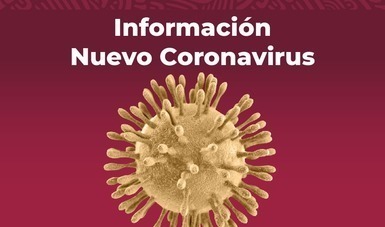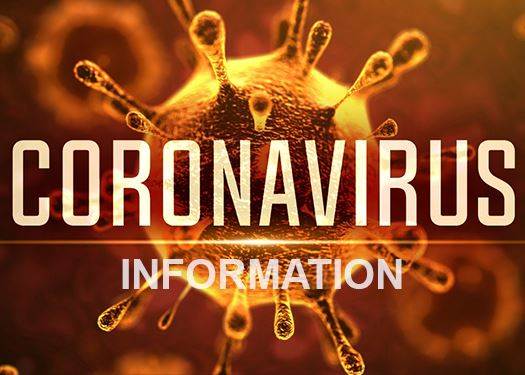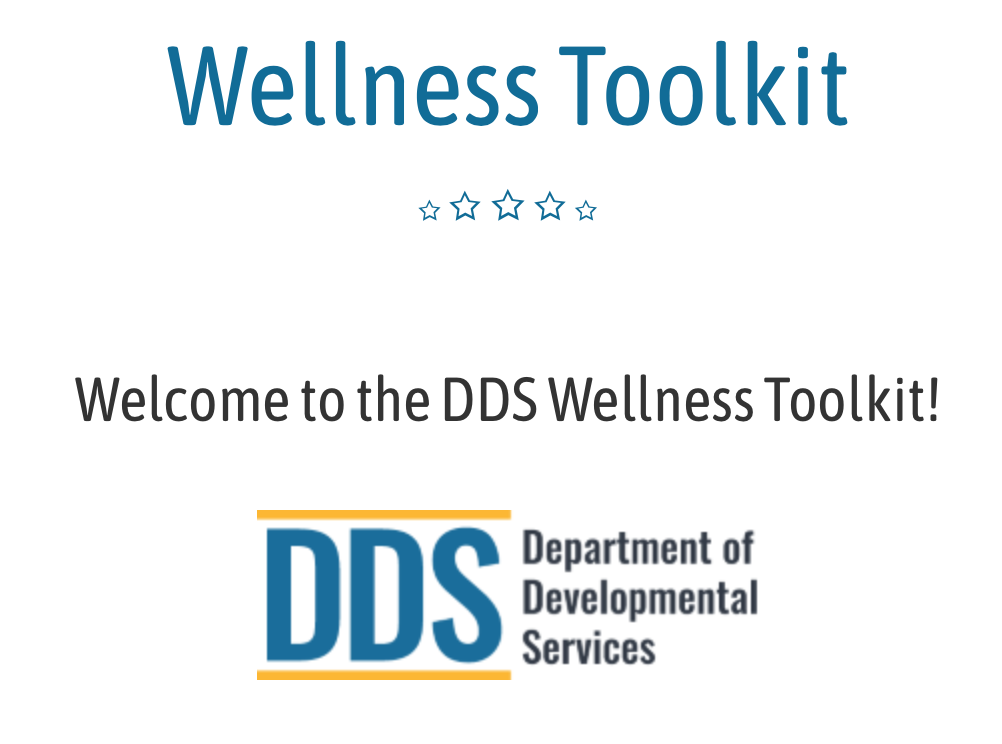Delegation from Japan Visits Lanterman to Learn About Regional Center Service Delivery System
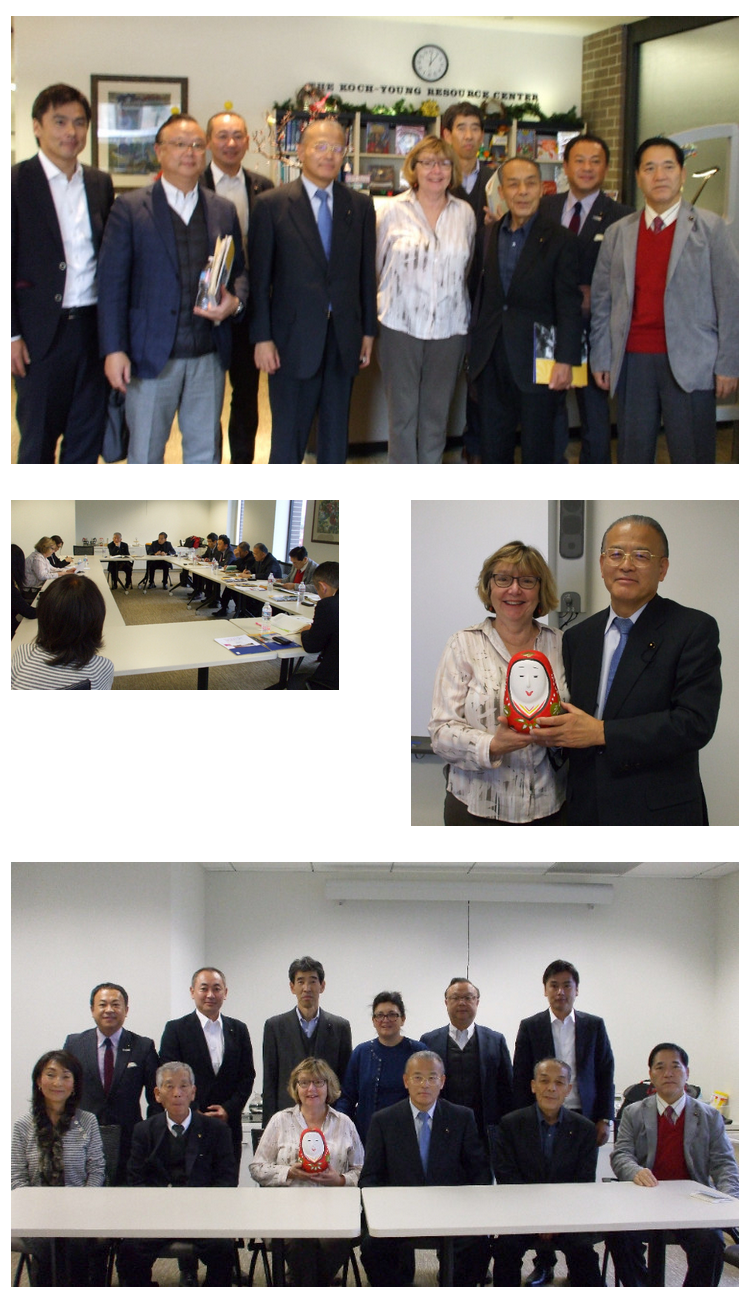
In early December, a delegation from the Ōita Prefecture, a prefecture of Japan on Kyūshū Island, visited Lanterman Regional Center.
The group consisted of 12 assembly members who were here to study California's developmental disabilities service delivery system.
The visit to Lanterman was facilitated with the help of Mariko Magami from the Japanese Speaking Parents Association of Children with Challenges Support Group.
Rose Chacana from Lanterman's Koch-Young Resource Center shares, "Over the years, Mariko has been instrumental in connecting Japanese officials with Lanterman Regional Center to learn about our system of care."
The group also presented Lanterman Executive Director Melinda Sullivan with a good luck figure.
Formatting Issue on Annual Financial Reports Fixed, Statements Being Resent

Each year, Lanterman sends our clients, their parents or authorized representatives an annual statement that reports the services and supports purchased by Lanterman Regional Center on behalf of the client for the period of July 1 to June 30, based on payments that were made through August of that year. This year’s statements were sent out the second week of December and it was brought to our attention on December 20 that there was a formatting glitch in the English and Spanish versions of the statements. This was caused by a computer error that resulted in the financial data not displaying properly and rendered the statements confusing to read. The issue has been corrected and the annual statements are being reprinted and will be resent by the end of the week. Lanterman apologizes for any confusion that was caused. Should you have any questions about the statement, contact your service coordinator. Please note that this statement is not a bill and no further action is required on your part.
Affordable Housing Coming to Koreatown in 2017
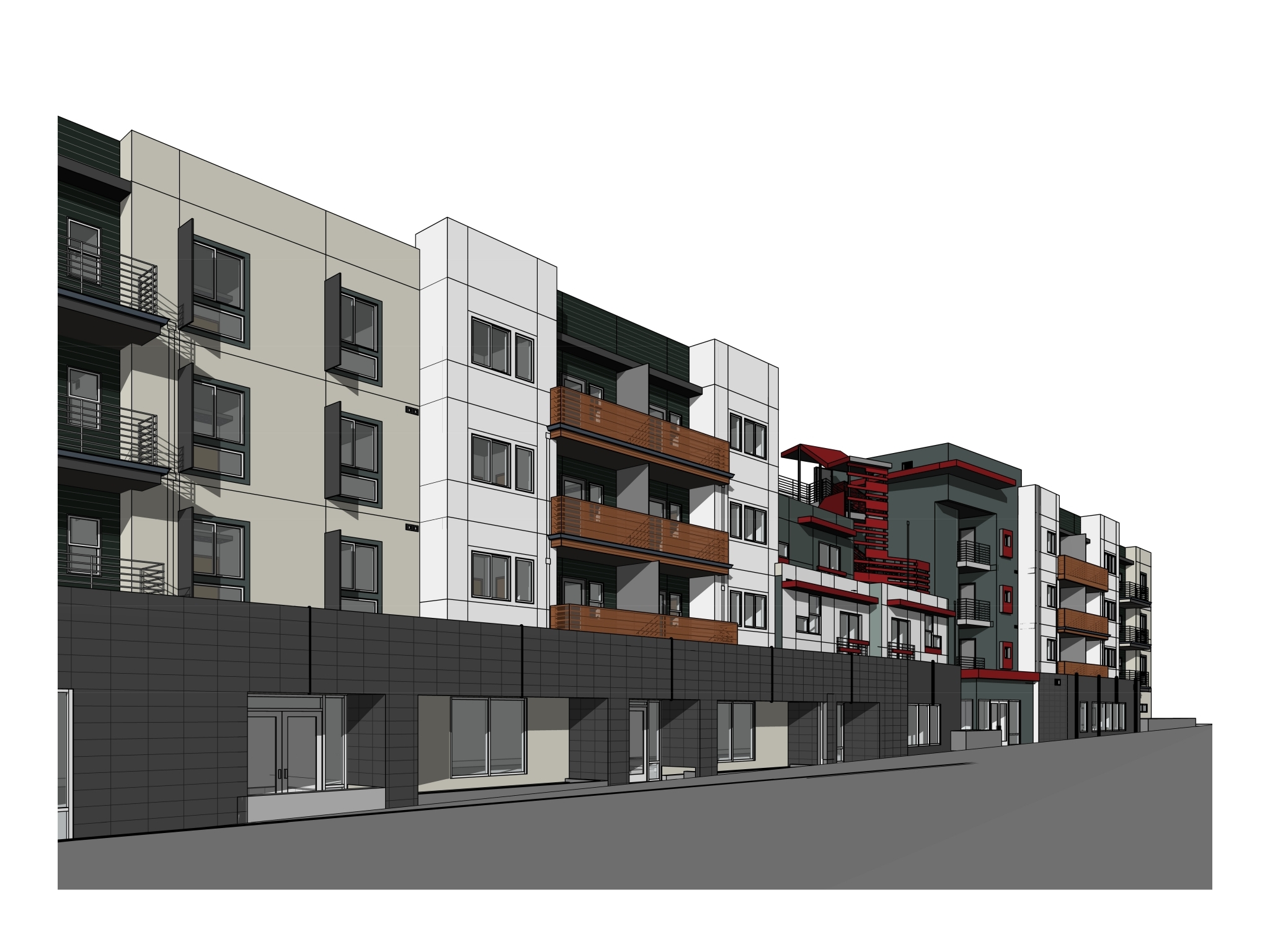
Coming in 2017, the Meridian Apartments will be an affordable housing project located within Koreatown. They will provide 100 units of affordable housing located at 225 N. Vermont Avenue in Los Angeles. All units at Meridian Apartments will be adaptable, and 14 percent will be accessible in compliance with Section 504 of the Rehabilitation Act of 1973, with 10 percent accessible units for mobility impaired households (10 units) and 4 percent accessible units for sensory-impaired households (4 units). The 14 accessible units will include a mixture of 1-, 2- and 3-bedroom units.
Although rental applications are not being accepted at this time, there is an interest list tab on the Meridian Apartments Web site for prospective residents to fill out. Please note, it is the responsibility of the prospective resident to keep contact information current. Do not fill out the the interest list contact form more than once unless you are updating your information.
Approximately four to five months prior to project completion, the property management company will reach out to prospective tenants with further information and hold an electronic lottery to determine the order of tenants able to apply to live at Meridian Apartments. There will be a separate lottery for all potential residents who indicate a need for a mobility or sensory impaired unit.
Remember, it is a lottery – there are no promises, but if you do not sign up on the interest list you will not have the opportunity to apply. Clients and families that need assistance completing the interest list, should contact their service coordinator.
About the Meridian Apartments
The Meridian Apartments are another quality tax credit project developed by AMCAL and Korean Churches for Community Development and professionally managed by FPI Management Inc.
Meridian Apartments will provide 100 affordable homes to families and 4,500 square feet of ground floor commercial space along Vermont Avenue. Located less than one block from the Vermont/Beverly Metro Red Line Station, residents will enjoy all the conveniences of this transit oriented development. The spacious floor plans will include 2 studios, 41 1-Bedroom, 24 2-bedroom and 33 3-bedroom units. On-site amenities include barbecue areas, dining terrace, a playground, large courtyards, elevator access, underground parking, bicycle storage and a clubhouse with offices, a computer lab and kitchenette. Meridian Apartments is seeking a LEED Gold Certification and LifeSTEPS will provide complimentary social services for residents.
Learn more about the Meridian Apartments
Complete the interest list form
Service Provider Ann Hamilton Meets with Governor Brown
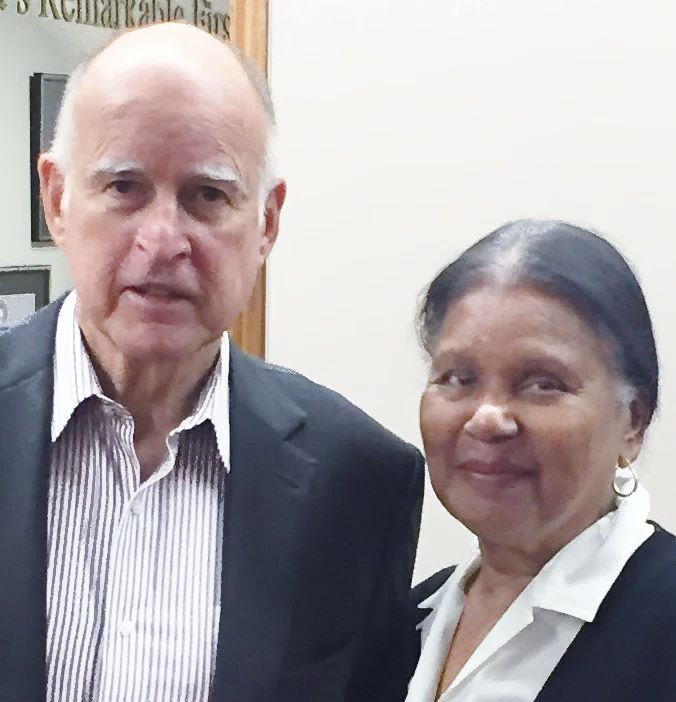
Governor Jerry Brown (left) with Lanterman Service Provider Ann Hamilton
On November 10, 2016, Lanterman Service Provider Ann Hamilton met with Governor Jerry Brown. She shares, "We had a meaningful conversation discussing a wide range of topics, including the residential care industry in California as it pertains to the elderly and individuals with developmental disabilities."
Specific points that Ann shared with the Governor include:
The increasing difficulty providers are having operating successful and profitable businesses in the current environment of increasing expenses and decreasing or static reimbursement rates.
How having facilities in adjoining cities with different minimum wages makes it necessary to request individual waivers by regional center client name, which is an onerous system for an agency charged with providing services for more than 300,00 clients and this causes significant delays in approving needed increases in reimbursement rates.
"Governor Brown assured me that he would have his staff look into our areas of concern and work toward rectifying any inequities in the system so that care providers could continue to provide quality services to the population that we serve," Ann adds.
Lanterman Community Makes Ornaments for State Capitol Tree
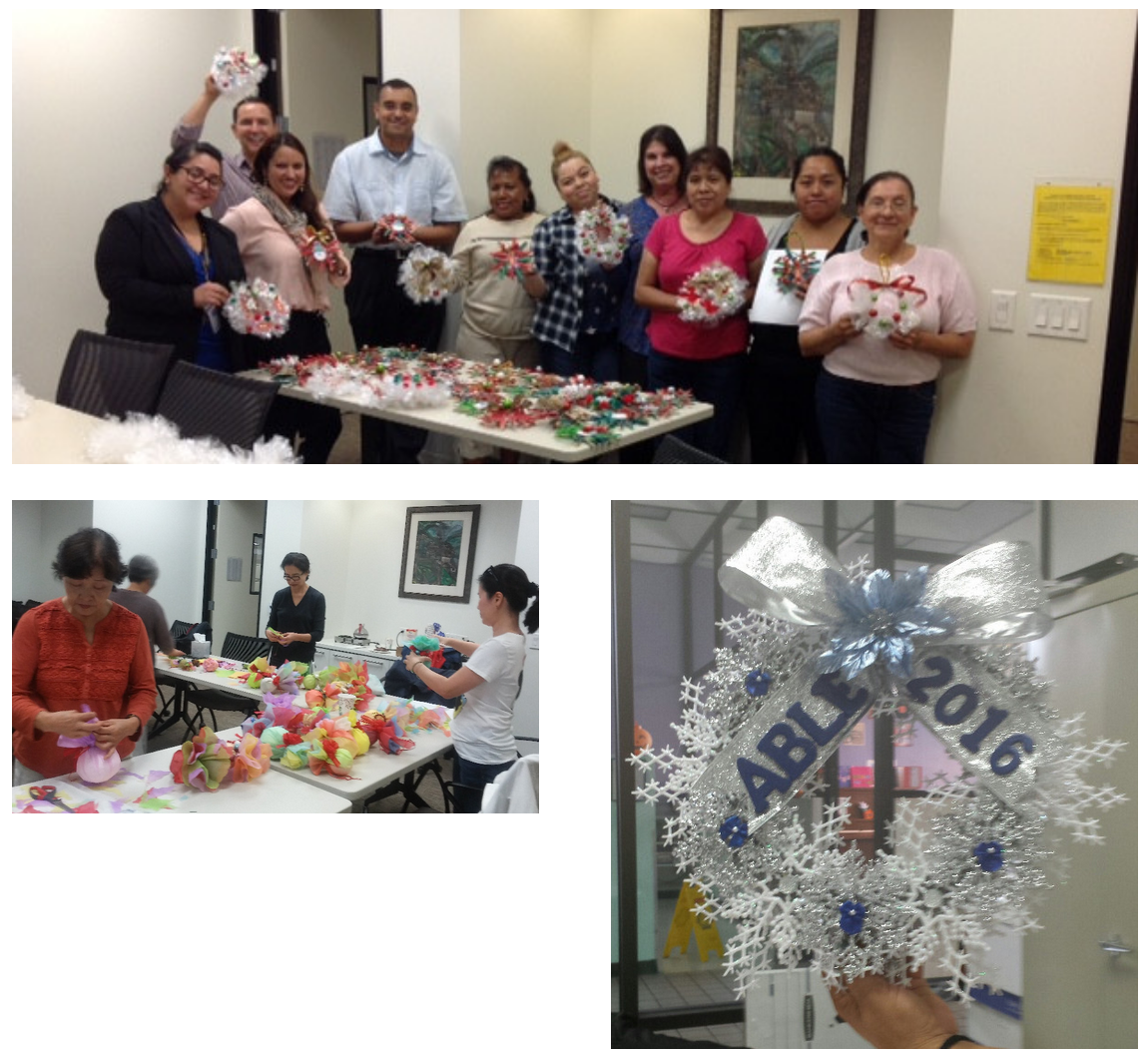
Heeding the call for handmade ornaments for the State Capitol tree, the Lanterman community made ornaments to send to Sacramento.
- Top: One of the Spanish-speaking parent support groups made 82 ornaments for the tree.
- Bottom Left: The Korean Parent Support Group made 73 ornaments to send.
- Bottom right: The ornament made by Adult Basic Learning Environment in Glendale for the 2016 tree.
The tree lighting ceremony will take place in early December.
Sam Suzuki Retires, Replaced by Lorenzo Hernandez as Manager
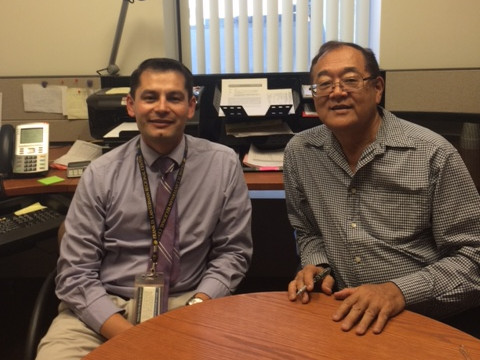
Pictured: Lorenzo Hernandez (left) and Sam Suzuki
Sam Suzuki Says Goodbye After 39 ½ Years at Lanterman
With Lanterman since June 1977, Sam Suzuki started his career as a service coordinator working with families in the Foothill communities. Lanterman was still part of Children's Hospital Los Angeles and had two satellite offices, one in Eagle Rock and one in Hollywood. He was one of just seven service coordinators covering the entire Foothill region, individual program planning had just started, and caseloads were small. Four years later, in 1981, he became a manager, a capacity he served in for 35 years.
Sam attended Loyola High School and decided to pursue a bachelor’s degree in philosophy at Maryknoll Seminary where he was studying to become a priest. He obtained his master’s in social work at the University of Southern California in the 1970s and became a Licensed Clinical Social Worker in 1981.
He championed inclusion of children with special needs, promoting social acceptance and working with school districts to address the fears and anxieties that came along with the growing push in the 1990s for inclusion of all children, including those with significant disabilities, in school and after school activities.
“I have equally enjoyed being a teacher and mentoring new service coordinators. I started the Center’s LA School Age unit in 1999 and have been its manager ever since. I have enjoyed the opportunities to pass on some of my experience and wisdom to others,” he adds.
And he wants everyone to know how touched he was by what he calls a masterpiece of a retirement party that was organized by his team. “Leaving Lanterman is bittersweet. I’m excited for what the future holds, yet sad for what I’m leaving behind. The team that I supervised was like family to me and I’m leaving a great part of my life behind by retiring,” he shares.
A resident of Montebello for nearly 40 years, Sam plans to spend more time helping at his parish church, Our Lady of Miraculous Medal in Montebello. He and his wife, who also retired this year, plan to do some fall cleaning around their home they have lived in for 40 years, and he wants to replant his flower garden. He also plans to take up exercise classes at the local YMCA. Sam says, “I don’t have a major bucket list, my wife wants to travel a bit more and I enjoy sports, so I’ll be able to follow the LA Rams more closely.” And he’s looking forward to the joy of having grandkids, hopefully sooner rather than later.
From all of us at Lanterman Sam, fair winds and following seas.
Meet Lanterman’s New Manager for the Los Angeles School Age Unit
Lorenzo Hernandez started at Lanterman in July 2011 as a temporary service coordinator in the Los Angeles School Age unit, becoming a permanent employee in March 2012. Five years after coming on board, he became the Unit’s manager, replacing long-time manager Sam Suzuki upon his retirement.
Lorenzo has an undergraduate degree from California State University, Northridge (CSUN). Prior to coming to Lanterman he worked with school-age children and their families for about 10 years. His focus was on behavior modification, specifically ABA and parent training, as well as with parent support groups, and also in the area of mental health. He shares, “It was rewarding assisting a child via behavior modification to develop a better way to express themselves and use alternative forms of communications, instead of a tantrum to express their needs.”
In his new role as manager, he will be working towards developing greater collaborative efforts between the entire support system – the school district, parents, community agencies, service providers, and the students with developmental disabilities themselves. “Our goal by working collaboratively is to put the best supports possible in place to ensure the best outcomes for the child,” he explains.
Lorenzo graduated from CSUN with his masters’ in public administration in 2014. In his free time he enjoys photography, reading, and road and mountain bike events. And he is getting married this month.
Korean Parent Support Group Visits Taft College
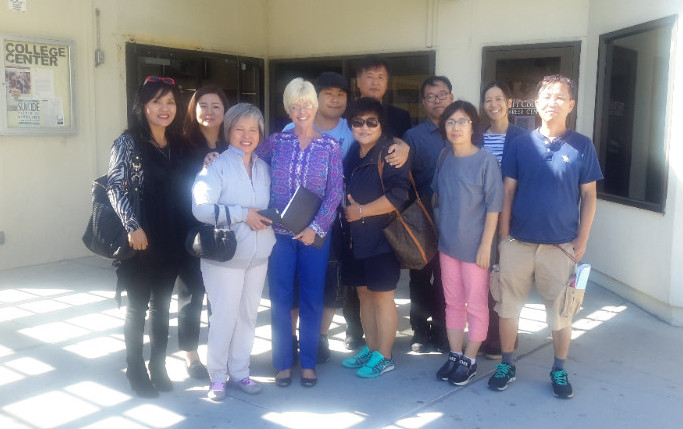
Lanterman's newest Family Support Specialist Jamie Cha-McGrath organized a trip for nine parents from the Korean Parent Support Group in mid-October to Taft College to check out the school's Transition to Independent Living (TIL) Program.
She shares, "Parents wanted to know about college options for their child with special needs, so I arranged the trip." Parents toured the campus and were able to see the dorms, an activity room, classrooms, laundry facility, cafeteria, campus library, and also where cooking classes are taught.
Three Lanterman clients from Jamie's previous caseload as a service coordinator are currently attending the College.
To learn more about the TIL Program at Taft College visit www.taftcollege.edu/tcwp/til/.
Tea for Sibs Held at Chado Tea Room
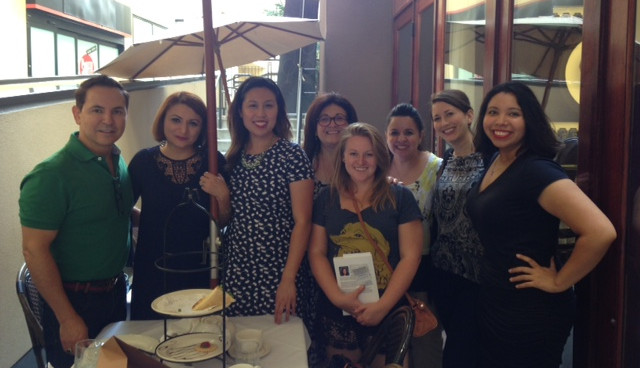
In an effort to build relationships and provide support for adult siblings, Lanterman Regional Center and Chado Tea Rooms hosted Tea for Sibs, a Sunday afternoon tea event in early October for the California Sibling Leadership Network (CASLN). The group of adults siblings (18 years and older) met at Chado Tea Room in Hollywood for the first of many social gatherings for the group. Siblings came from all over California - San Diego, East Los Angeles, the Westside, and close to home - to get to know each other and share their stories about having brothers and sisters with special needs.
Check out the CASLN Facebook page and stay tuned for future gatherings. We also look forward to hosting our annual Alson’s Tea event for younger siblings in spring 2017.
Lanterman Recognizes SPAC Members for Their Service
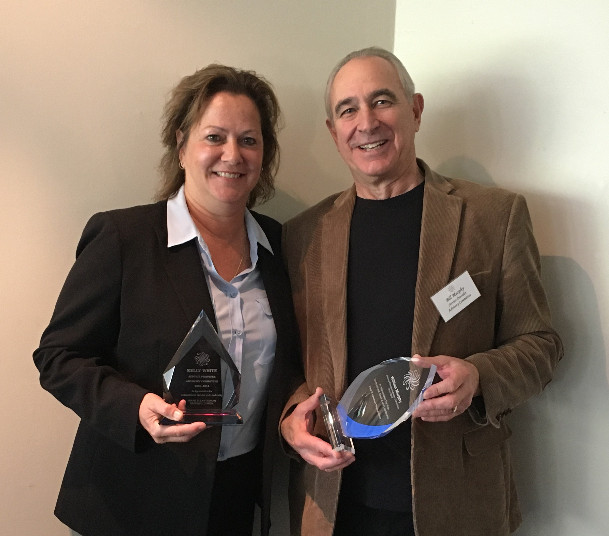
Thank you to Kelly White (left), CEO of Villa Esperanza Services, and Bill Murphy, CEO of FVO Solutions, for your service on Lanterman's Service Provider Advisory Committee (SPAC). Kelly served 10 years on SPAC, eight of them as chair, which meant she also represented service providers on the Lanterman's board of directors. Bill served on SPAC for five years and is retiring in December.
Learn more about SPAC
CAPTAIN Conference Presents Evidence-Based Practices in Autism
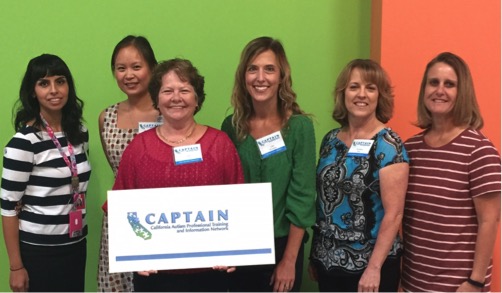
Pictured are some of the CAPTAIN LA-Foothill Region cadre members (left to right): Patricia Juarez, LAUSD; Amy Tseng, LAUSD; Jean Johnson, Lanterman; Lisa Pirruccello, Lanterman; Christine Karg, GUSD; Anjanette Michalopoulos, BUSD
Lanterman, in collaboration with the Los Angeles, Burbank and Glendale Unified School Districts, recently sponsored a collaborative training developed by the local cadre of the California Autism Professional Training and Information Network (CAPTAIN) on the use of evidence-based practices in supporting people affected by autism. Educators, families and caregivers for people with autism and other developmental disabilities took part in a variety of presentations on effective methods to teach and support people with special needs in their own homes, campuses, jobs and communities. Conference participants learned the importance of employing scientifically proven techniques, referred to as evidence-based practices, to maximize learning and independence for persons with autism at all ages, and in natural settings and circumstances.
In addition, the conference served to open a critical discussion of the future of supports for people with disabilities as the country recognizes the importance of transition from the structured protected environments provided through special education services and secluded day program options towards the expectation of true community integration in living, working, and post-secondary educational settings.
Not to worry if you weren’t able to attend, as CAPTAIN presentations on evidence-based practice will also be available through Lanterman parent support groups, and LAUSD PRESS (Parent Resources for Engagement and Student Success) trainings ongoing at local school campuses throughout the district. Find one in your area by going to the LAUSD Web site and search using keyword PRESS. You can also visit the CAPTAIN Web site at www.CAPTAIN.CA.gov for additional information and downloadable resources, and follow upcoming CAPTAIN events on Facebook. Educators, paraprofessionals and service providers can learn more about evidence-based practices, including obtaining certificates of completion for specific practices, by enrolling in the Lanterman Learning Center or by contacting Lanterman’s Training and Development Department at training@lanterman.org.
CAPTAIN is a multi-agency collaborative of Department of Education, Department of Developmental Services, University Centers of Excellence in Developmental Disabilities, and the Family Resource Center Network formed to provide local trainings, web-based resources and specialist guidance for educators, service providers, families and individuals whose lives are affected by developmental disability. CAPTAIN was formed in an effort to answer the mandate for the use of evidence-based practices when using public funds to support the provision of educational, health care and developmental services, such as those provided through the regional center system.
Ornaments Needed for the Capitol Tree

Breakout the Glitter, Glue Guns and Tissue Paper - It's Time to Get Crafty and Start Making Ornaments for the State Capitol Tree
For more than 20 years, ornaments made by persons with developmental disabilities have adorned the state tree during the holidays. The Department of Developmental Services (DDS) has been asked once again to participate in the official State Capitol Tree Lighting Ceremony, which will take place in early December.
DDS is requesting ornaments from regional center clients to decorate the tree. If you or your program/agency would like to make and donate one or more ornaments, please check out the guidelines for participating and the ornament submission form.
Ornaments must be received by Wednesday, November 9, 2016.
Meet the 2016-17 Project SEARCH - Kaiser Permanente Los Angeles Medical Center Class
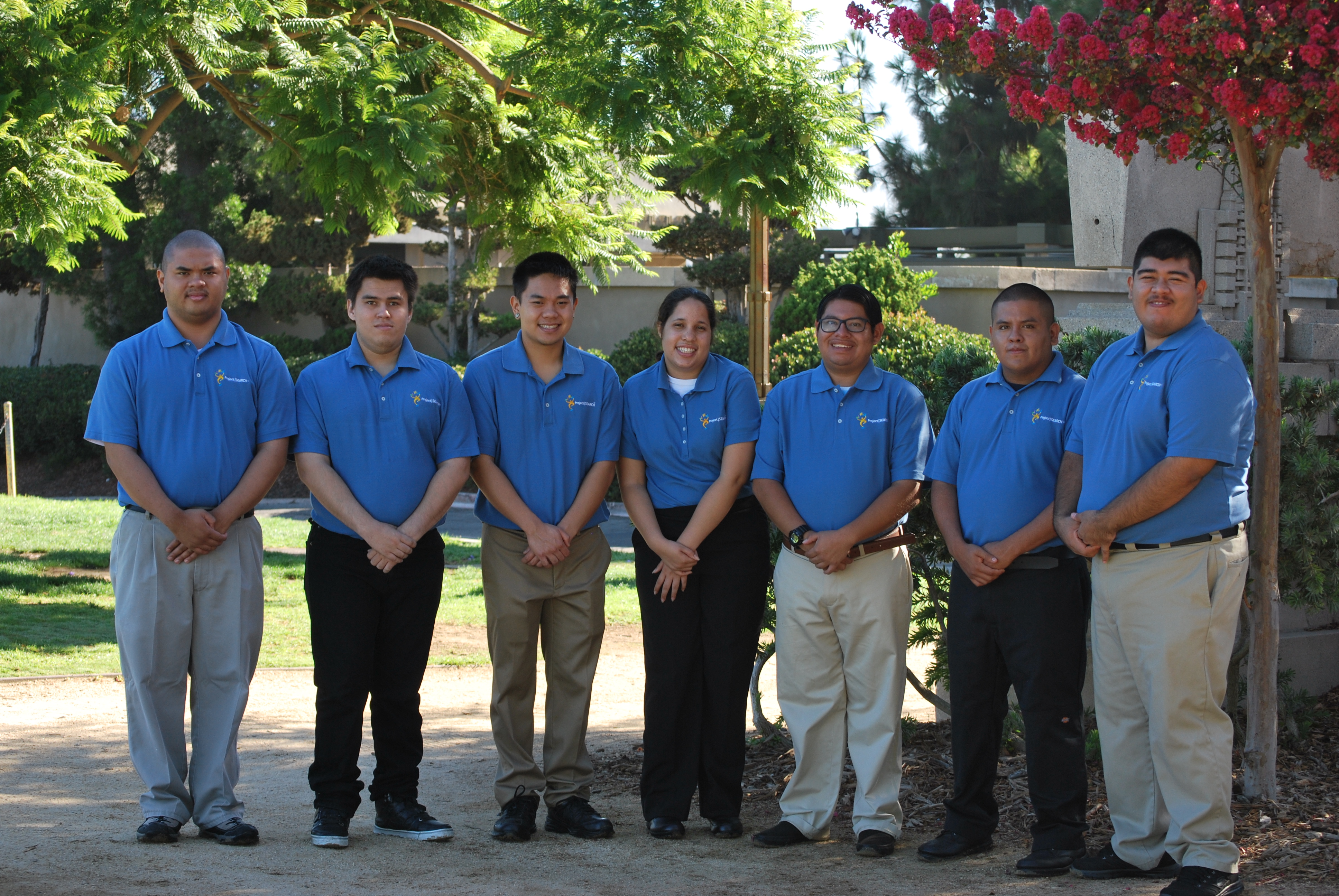
From left to right: Andrew Francisco, Gildardo Hernandez, George Chan, Amalia Reoyo Olazabal, Bruce Ictue, Ariel Alvarez and Edgar Lopez
There are seven young adults in the second Project SEARCH class that started in the fall.
The first class at Kaiser Permanente Los Angeles Medical Center had three participants in this innovative program. They graduated in the early summer and all three are continuing on at Kaiser as paid employees.
About Project SEARCH
Project SEARCH is a program for young adults with disabilities to learn job skills through unpaid internships. The interns are in their last year at LAUSD and they will participate in three 10-week internships throughout various Kaiser Permanente Los Angeles Medical Center departments, such as OB/GYN, Ambulatory Services and Volunteer Services.
The goal for Project SEARCH interns is to gain valuable work experience that will lead to paid employment after graduation. LAUSD students interested in finding out more about Project SEARCH should speak with their teacher or their service coordinator at Lanterman.
For general information about Project SEARCH visit their Web site.
October 11 is the Deadline to Participate in the Disneyland Community Involvement Program

Tuesday, October 11 is the deadline to submit info and participate in the Disneyland Community Involvement Program. Check out our latest e-mail bulletin for info and instructions on participating.
File
HCBS Regulations - Provider Funding for Compliance Activities

Please note...DDS has extended the deadline for submission to October 30, 2016.
On August 3, 2016, the Department sent the attached information regarding the process for requesting funding to assist providers in making changes to meet the federal Home and Community-Based Services (HCBS) settings requirements. To allow more time for the development and completion of these proposals, the Department is extending the deadline until October 30, 2016, for service providers to submit proposals to regional centers. The information received with these proposals regarding strategies to address needed changes will be very important as we move forward. Therefore, it’s essential that service providers are made aware of this opportunity to, in conjunction with clients and family members, develop ideas for needed changes to meet the HCBS requirements.
Files
DDS Holds Local POS Disparity Data Meeting
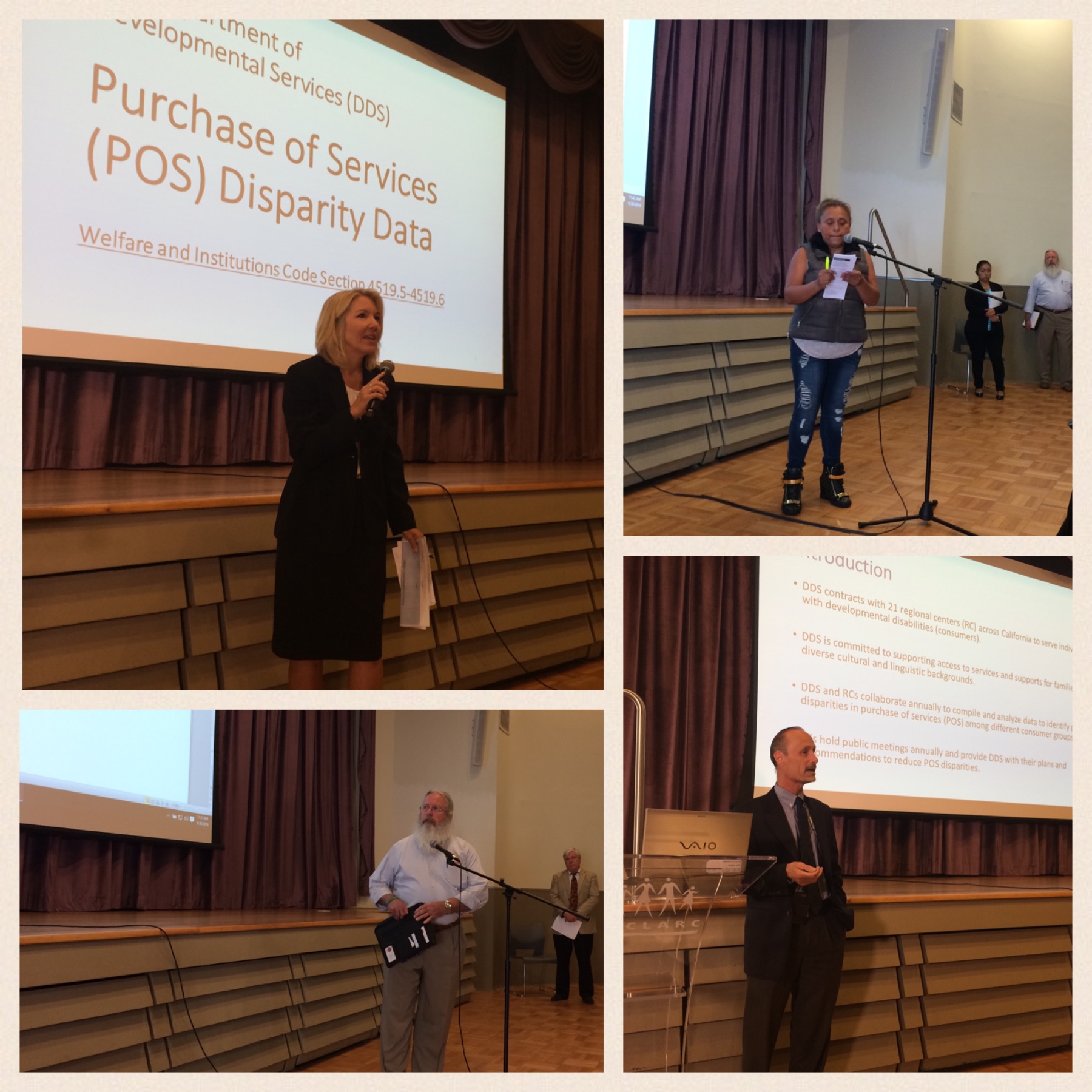
Clockwise from top left: Nancy Bargmann, Director of the Department of Developmental Services (DDS); Julisa Pineda, Lanterman parent; Brian Winfield, Acting Deputy Director, Community Services Branch, DDS; and Pierre Landry, Chairperson of the Los Angeles State Council Regional Office
The Department of Developmental Services (DDS) conducted four meetings throughout the State to discuss and develop strategies for addressing disparities in purchase of services. On Friday, August 26, 2016, DDS met with the Los Angeles Regional Centers. The Department shared purchase of service (POS) data for the entire State while local regional centers shared activities and efforts intended to reach out to underserved communities.
Lanterman Regional Center shared the success of its Promotora Project and that it intends to apply for some of the special disparity funding from DDS to replicate this project in its Korean community. Lanterman also advocated for DDS to use some of its funding to purchase an automated message system so families can receive messages in their native language as well as for DDS to fund a statewide study of the disparity issue.
The study would seek to better understand whether these differences are a result of family decisions due to differing cultural beliefs and preferences; personal or family choice; or if these variances are due to inequities prevalent in the developmental disabilities service system based on lack of culturally competent services, linguistic barriers, socioeconomic or other factors that in some way limit access to services and negatively impact utilization of services.The study should consider regional differences such as rural, urban and other factors representative of the State as a whole.
A Well-Developed ITP Puts Ricardo Lopez on the Path to Higher Learning

Ricardo Lopez is a highly motivated student with a passion for learning and a strong desire to continue his education. He is 18 years old and has a diagnosis of autism. During his senior year of high school, Ricardo faced the overwhelming challenge of taking the SAT and ACT in order to apply to four-year universities. Despite the unnerving feeling, Ricardo faced the exams head-on and successfully completed both, allowing him to apply to multiple universities.
As a result of his hard-work and determination, Ricardo was ultimately accepted into four California State Universities. He chose to attend California State University, Northridge (CSUN) and has enrolled in five courses for the fall 2016 semester.
In part, Ricardo’s successful transition was due to his well-developed Individualized Transition Plan (ITP). The ITP successfully highlighted Ricardo’s desire to attend a four-year university and incorporated this into his post-secondary educational goal. His ITP also addressed specific activities to support the achievement of the goal. For example, Ricardo was to be provided with assistance in identifying and applying to four-year universities that met his interests. Due to the thoroughness of his ITP, Ricardo successfully transitioned into CSUN and is now provided with the opportunity to further pursue and accomplish his future goals and aspirations.
Voting Rights Restoration for Lanterman Clients That Are Conserved

Senate Bill 589, became effective as a new law on January 1, 2016, and indicates that an individual under conservatorship who has lost his or her right to vote can have their right to vote restored. Courts are implementing the new law during the biennial visits by the probate investigator.
When the probate investigator conducts a biennial visit, clients will be asked whether they want to vote and they have three choices: "I want to vote," "I don't want to vote," or unable to answer. If it is "I want to vote," the court will be notified and the right will be returned. The court will also notify the county registrar of voters. Please note, that for new petitions, the petition has been changed to address the issue of voting rights.
For clients who are conserved and want to vote in the election on Tuesday, November 8, 2016, they need to notify the probate court and register to vote before October 24, 2016. Clients can inform the probate court with a simple letter to the presiding judge indicating "I want to vote." The letter should include the probate court's conservatorship case number. Once the written statement is received by the court and is verified, the court will enter an order to restore the individual's voting rights and provide notification to the county registrar of voters. Once rights are restored, the client should contact the registrar of voters to complete their voter registration.
The address and phone number for the Los Angeles County Probate Court is:
Stanley Mosk Courthouse
111 North Hill Street
Los Angeles, CA 90012
213.830.0850
To vote in the November elections, the above steps must be completed by Monday, October 24, 2016.
Budget Facts and Figures Made Easy
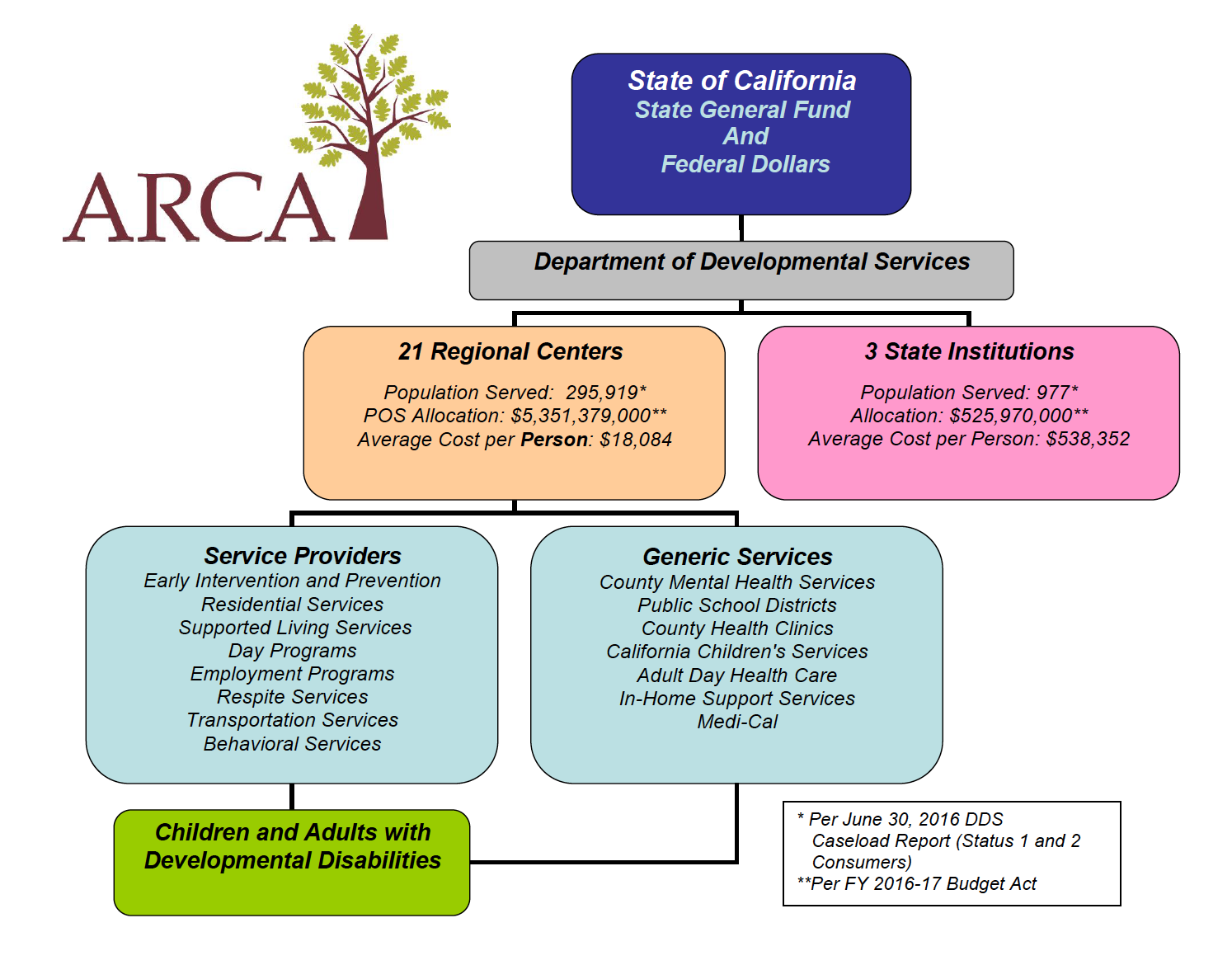
With pages and pages filled with information and figures, the section of the state budget related to developmental services and regional centers is not all that approachable. But, the Association of Regional Center Agencies has made it alot easier by providing a funds flow chart for 2016-17 and some budget facts and figures presented in pie chart format.
And there are some interesting take aways:
Funds Flow Chart 2016-17
This chart graphically depicts how the combination of state (“general fund”) and federal funds are moved through the State and to the services and supports required by persons with developmental disabilities. Points of note are the comparative cost-per-person of developmental centers versus community services, and the fact that generic services meet many needs, and must be accessed first.
Regional Center Budget and Demographic Information Charts
These charts show the breakdown of funds in our system, as well as some information on client characteristics. Major points, one per chart, are:
- Administrative expenses are less than a single percent.
- Federal funds (and meeting our promises that get those dollars) remain critical, providing 40 percent of our system’s $6 billion dollars.
- Regional center services are an order of magnitude more cost-effective than developmental center services.
- Residential services is the single largest cost component for people served.
- Early Intervention is a small but real portion of our population, and each person served has the potential for better, and less expensive, outcomes as a result.
- Again, residential services are the most expensive service provided – making it very important to help support people in the family home.
- Our community’s ethnicity is roughly reflective of the State, but cultural differences and socioeconomic issues drive the complex topic of barriers to service.
- While intellectual disabilities were, historically, the focus of our system, autism is the growing developmental disability.
- Nearly half of people served are under the age of 18. They are more likely to have autism, and are daily entering a community system built around different needs that needs to be rebuilt around new needs.
- Compare the costs of residential services as a portion of the budget against where people actually live. The family home is often – but not always – the preferred residence. Supporting families in their homes, such as respite services, meets their needs better, and is more cost-effective, too.
- Men continue to be disproportionately represented in our system, driven in part by the gendered prevalence of autism.
Take a minute to look through the charts for a better idea of how funds flow through and are broken down in our system.
Files
CDCAN Reports Breaking News on the Recent Appointment of Nancy Bargmann as Director of DDS

BREAKING NEWS: NANCY BARGMANN TAPPED TO BE NEW DIRECTOR OF DEPARTMENT OF DEVELOPMENTAL SERVICES - APPOINTMENT PRAISED BY ADVOCATES
Currently Works for San Gabriel – Pomona Regional Center Since Last Fall After Stepping Down Last July As Deputy Director of Community Services Division in Department of Developmental Services
SACRAMENTO, CA [BY MARTY OMOTO, CDCAN - LAST UPDATED 03/04/2016 2:53 PM] - Governor Brown, in a statement released late this afternoon, announced the appointment of Nancy Bargmann, age 54, a widely respected former senior department official, as the new director of the Department of Developmental Services. The appointment requires confirmation from the state Senate likely sometime early next year, though Bargmann can serve in the position until then. News of the Bargmann appointment is being greeted with high praise and strong support by advocates and policymakers across the State.
Diana Dooley, Secretary of the California Health and Human Services Agency, released a statement this afternoon to department staff, praising Bargmann’s “…dedication, energy and caring she brings to her work and to the individuals we serve...," reflecting the reaction of many advocates, regional centers, and others who have worked with Bargmann.
The Department of Developmental Services, under the California Health and Human Services Agency, oversees the community-based services and supports funded through the 21 non-profit regional centers who in turn contract local community organizations and individuals to provide services to over 300,000 eligible people with developmental disabilities across the State. The department also owns and operates the three remaining health facilities called developmental centers and one smaller facility.
Bargmann will succeed Santi Rogers, who retired from state service on November 30. California Health and Human Services Agency Under Secretary Michael Wilkening has served as acting director since then and will continue to do so until Bargmann assumes the position sometime in the coming several weeks, though no exact starting date has yet been announced.
Diana Dooley, Secretary of the California Health and Human Services Agency, promised last October when Rogers’ announced his retirement, that she and her team would look for the right person to lead the department at a time when the State has embarked on a wide range of sweeping transitions to meet new federal requirements, and efforts to resolve long and short term issues of funding and resources in the community impacting people with developmental disabilities. Those major transitions include the State’s efforts moving forward on the historic closures of the remaining State-owned and operated developmental centers (except for the secured treatment area of Porterville Developmental Center); major changes in community services to comply with new federal Medicaid Home and Community Services Waiver regulations; compliance with the new federal Workforce Innovation and Opportunity Act; transitions and efforts dealing with critical funding and resource issues for people needing services and supports in the community, including those with unmet needs; issues related to reducing cultural disparities across the State; implementation of the new Self Determination Program; implementation of competitive integrated employment; transition of over 13,000 children to receive behavioral health treatment under Medi_Cal managed care; and other major initiatives.
Bargmann currently works for the San Gabriel – Pomona Regional Center in Pomona since last fall, after stepping down at the end of July last year due to family health reasons, as deputy director of the Department of Developmental Services’ community services division that oversees, among other things, regional center funded community-based services and supports. Bargmann served in that position for over three and half years, serving first under former department director Terri Delgadillo and then under Santi Rogers.
In that previous position Bargmann played a key role in bringing together diverse and sometimes competing stakeholders to navigate and implement major changes in state and federal policies impacting people with developmental disabilities and earned the respect of persons with developmental disabilities, their families, providers, regional centers and other advocates and policymakers. She was a visible presence over the years at numerous budget and other legislative hearings and stakeholder meetings up until last July when she stepped down as deputy director.
GOVERNOR'S PRESS RELEASE
Nancy Bargmann, 54, of Long Beach, has been appointed director at the California Department of Developmental Services, where she was deputy director of the Community Services Division from 2012 to 2015. Bargmann has been associate executive director at the San Gabriel-Pomona Regional Center since 2015. She held several positions at Home Ownership for Personal Empowerment Inc. from 2009 to 2012, including executive director and business consultant and held several positions at the MENTOR Network from 1998 to 2009, including vice president of operations, vice president of business development and California state director. She held several positions at the Inland Regional Center from 1985 to 1998, including community services director, resource manager, adult services program manager and client services coordinator. Bargmann earned a Master of Business Administration degree from the Pepperdine University School of Business and Management and a Master of Science degree in social work from San Diego State University. This position requires Senate confirmation and the compensation is $186,572. Bargmann is a Republican.
STATEMENT RELEASED BY SECRETARY DOOLEY ON APPOINTMENT OF BARGMANN
The following is a statement released by Secretary Dooley to all staff of the Department of Developmental Services today, on the appointment of Nancy Bargmann as director: “I am very pleased to welcome Nancy Bargmann back to the Department of Developmental Services as the new Director. Nancy brings over 30 years of experience in serving individuals with developmental disabilities, including a wealth of knowledge in developing community resources, which will be extremely valuable as residents living in the developmental centers transition to community living and as individuals age out of their family homes and move into the community. Those of you who have worked with Nancy know the commitment, dedication, energy and caring she brings to her work and to the individuals we serve. For those of you who haven’t had the opportunity to work with her yet, you’re in for a treat. Please join me in congratulating Nancy on her appointment.”
Deadline to Opt Out of Court Decision Impacting Families of Young & School Age Children is April 1

If you are the parent or guardian of a child (including an infant) with disabilities; the parent or guardian of a student who is attending or attended a California school at any time since January 1, 2008, you should be aware a federal court has ordered the release of personal protected information, including behavior, health and discipline reports, Social Security numbers and home addresses to a nonprofit which claims it wants to ensure disabled students are being treated fairly under the Individuals with Disabilities Education Act and other laws.
The court order states that information will not be made available to the public, but this puts the responsibility in the hands of the nonprofit.
You can file an objection to information related to your child and your family being released. However, it is unclear whether the objection will prevent your child’s information from being released.
You must print and fill out a form or mail a private letter to the judge. There is no electronic means of notifying the court. Any objection must be received by the court by April 1, 2016.
DOWNLOAD AND PRINT THE FORM THAT MUST BE COMPLETED AND SUBMITTED TO THE COURT BY APRIL 1, 2016
Read the Court's complete decision and its order
Read a news release about this from the California Department of Education
Read the San Diego Union Tribune article about this decision
Howard McBroom Heads to Germany to Share His Experience Living Life Through the Lens of Autism

Howard McBroom’s recent trip to Germany to share his experience living life with a diagnosis of autism all came about from a 2011 interview he did for the Los Angeles Times.
The article was read by Jette Paetz, a graduate student of Dr. Georg, and the wheels were set in motion. In 2012, Dr. Georg traveled to Los Angeles for a face to face interview with Howard for his book, “The Practice of Autism in America.” One thing led to another and three years later, Dr. Georg proposed that Howard travel to Germany to speak at a conference he was organizing about autism that would bring psychiatric professionals and people with autism together for the first time for meaningful discussion.
The biggest hurdle for Howard was getting a passport, but with the help of Jacquelyn Castillo, his community living specialist at United Cerebral Palsy, and Srbui Ovsepyan, his Lanterman service coordinator, he got it. With his essentials packed, Howard’s trip started on November 13, and for 10 days Howard brought, what he dubbed “Hope from America,” sharing his story, the effects of autism on him personally, and also about the regional center system on self-determination. The conference laid the groundwork for increased cooperation between the communities with autism in America and in Germany.
Howard shares, “This was an experience of a lifetime. I am very proud to represent the Regional Center in such a large scale advocacy effort and I look forward to more opportunities as an international speaker.”
Getting Ready for El Nino

As you know, heavier-than-usual rains, referred to as “El Nino” are expected in the Los Angeles area. The latest forecasts are for the heaviest downpours to be throughout January, February and March, 2016. Among the greatest concerns are flooding and mudslides in some areas, power outages, street closures, leaking roofs and extra traffic.
The City of Los Angeles and Los Angeles County each have a registry which anyone can sign up for. If you provide your cell phone and e-mail address, notifications of emergencies and areas to avoid will be texted, called or e-mailed to you. All landlines are already automatically in the system. View a flyer that explains how to sign up for these registries.
There are also things you can do to prepare yourself and your family such as:
- Create an emergency kit that contains a minimum of 72 hours of food and water for each person, medications, first aid supplies, a flashlight and a radio.
- Develop a plan for communication and re-uniting if it should become necessary.
- To prepare your residence, repair roofs, trim trees and clear out gutters.
- For your car, make sure headlights and windshield wipers are in good working order.
- Do not walk or drive through flooded areas.
- For your pets, plan for pet food, water, medications and leashes.
Here are some helpful websites:
Unusual weather can cause increased fear and anxiety. Discuss it ahead of time if that strategy helps. For people with some types of disabilities, use pictures or videos or your home shower to illustrate heavy rain. Plan things to do for extended time indoors. Follow news reports and heed instructions to stay away from problem areas. It is impossible to know exactly how much rain is expected, but a little advanced planning can reduce panic and maximize everyone’s safety.
State Council on Developmental Disabilities Begins Next Phase of Child/Family Surveys

Starting November 2, 2015 through March 2016 the State Council on Developmental Disabilities (SCDD) Los Angeles Office will be sending out National Core Indicator Child/Family Surveys to parents and guardians of children, ages 3 to 18, who receive services from Lanterman, Eastern Los Angeles, Harbor, North Los Angeles County, South Central Los Angeles, Westside, San Gabriel/Pomona and Tri-Counties regional centers.
The National Core Indicators are standard measures used by many states to assess how people feel about the services that they receive from the developmental disability system. The questions address key areas of concern including service planning, community inclusion, choice, health and safety, rights and employment. The responses to these surveys will help California identify essential changes necessary to improve the quality of services at a statewide and local level.
The survey takes about 15 minutes to complete. All responses are confidential. No one will know your answers - not case managers, providers, support workers, or any others. Your answers will not affect you, your child, or the services your family receives. The survey comes with a pre-addressed, pre-stamped envelope.
Surveys will also be available in the following languages: Arabic, Armenian, Chinese, Farsi, Hmong, Khmer-Cambodian, Korean, Laotian, Russian, Spanish, Tagalog and Vietnamese
If you need help reading or understanding the survey, or need an interpreter, contact the SCDD Los Angeles office at 818.543.4631 or losangeles@scdd.ca.gov. When you receive the survey please complete and return it within two weeks.
Legislative Hearing Updates from ARCA
On December 1, there were two legislative informational hearings that are relevant to the work that regional centers do. Following is a summary by Amy Westling, Director of Policy, Association of Regional Center Agencies.
First, there was a hearing on the MCO tax in Los Angeles, which covered, by and large, familiar territory and information. Sen. Hernandez (chair) welcomed all participants and attendees. He noted with disappointment that the Department of Finance declined the conference committee’s invitation. He had been particularly interested in hearing from them why the tax is needed in light of the new funds recently reported by the Legislative Analyst’s Office (LAO).
Asm. Bonta and Sen. Mitchell were also in attendance.
* Felix Su (LAO) provided an overview of the various tax options and background.
* Mari Cantwell, DHCS, reviewed the Administration’s tiered tax plan, including the original from January and the updated version presented (and broadly publicized) in September.
* Nick Louizos, California Association of Health Plans, presented the perspective of the health plans, which continue to prioritize a limited, non-disruptive tax (if any). They remain concerned with the various tax proposals for various reasons. Additional CAHP priorities include a sunset on the tax, an automatic end to the tax if disallowed by the federal government, legislative reporting requirements, a revenue ceiling ($1.1 billion, to backfill or improve Medi-Cal programs only), and prevent any future tax changes (increases) without legislative authorization. Program improvements, he said, could include Medi-Cal provider rate increases.
As a note of inside ball, Sen. Mitchell asked whether or not the special session would continue beyond September 2016 when the Legislature adjourns. Sen. Hernandez responded by saying “it’ll go on beyond that, I believe.”
Public comment, running just under 45 minutes, was also taken. Speakers included a range of interests, including IHSS and independent living centers. A significant proportion of testimony came from the DD community, including self-advocates and service providers. Additionally, Melinda Sullivan (Executive Director, Lanterman Regional Center) spoke to the importance of ensuring that funding reform is included in any final package.
The Los Angeles Times covered the event, and an article has been published online.
Second, in Sacramento there was an informational hearing on services for children with special needs attended by Senator Richard Pan of Sacramento. It was comprised of a number of panels that focused on various facets of specialty care for children.
Senator Richard Pan, M.D.
* The Committee is concerned regarding the silos of care for children with special needs.
Dr. Edward Schor, Lucile Packard Foundation for Children’s Health
* Provided an overview of the systems of care that serve children with special needs.
Wendy Longwell, Family Voices of California
* Expressed concern regarding son transitioning out of CCS, which has been very helpful in coordinating personalized care.
* Explained the importance of parent-to-parent support to navigate the network of complex systems that are needed to meet the needs of each child.
Jennifer Kent, Director, DHCS
* Developmentally disabled children average costs in the Medi-Cal program of $1,700 per month, compared to $240 for all children.
* The Affordable Care Act allows for 90% federal matching for health homes. A draft plan to implement this will be released by DHCS soon.
* It is incumbent on agencies to better coordinate services so that care appears more seamless to families.
Barbara Sheehy, Contra Costa Administrator, California Children’s Services (2002-2015)
* CCS ensures that children are seen by highly qualified specialists to treat their specialized conditions.
* Some counties have specific programs to aid in the transition of youth from CCS to adult care.
* The Medical Therapy Units provide direct evidence-based therapies.
* Current challenges include fragmentation of care, low provider rates, and the potential for the loss of specialized care in the CCS transition to Medi-Cal Managed Care.
* Funding for kids without full-scope Medi-Cal is split between counties and the state.
Dr. Richard Chinnock, Board President, Children’s Specialty Care Coalition
· Pediatric subspecialty care must be provided in care centers to prevent burn-out of individual practitioners.
· Current challenges include the need for more rational data, better transitions from CCS to adult services, better reimbursement rates, mental and physical health coordination, better coordination of primary and subspecialty care, and creating medical homes.
· The CCS transition should proceed cautiously and retain what is working well.
Carol Gallegos , Deputy Director, California Department of Health Care Services’ Office of Legislative and Governmental Affairs
* Counties determine how available funding is spent to best meet local needs.
* Mental health agencies coordinate with other entities to meet the needs of dually served children.
* More work is being done on the development of a data dashboard to display information on performance outcomes for children with mental health needs.
Terry Rooney, Colusa County - Behavioral Health Director, County Behavioral Health Directors Association
· Counties continue to provide mental health services for children because there are insufficient providers available to contract with Medi-Cal Managed Care plans.
· Supporting children in less restrictive environments is a challenge.
Dr. Stewart Teal, Clinical Professor of Child Psychiatry, University of California at Davis, California Academy of Child and Adolescent Psychiatry
* Child psychiatry is a multi-disciplinary process.
* There needs to be a continuum of care in children’s mental health to prevent children from falling through the cracks.
* There needs to be a reliable way to share mental health information between counties, particularly for foster children.
Brian Winfield, Acting Deputy of Community Services, DDS
* Provided an overview of the regional center system, including the distinction between Early Start and Lanterman services and funding structures.
* DDS coordinates with other departments in the Interagency Coordination Collaborative and the BHT Medi-Cal transition.
* Purchase of Service dollars are distributed according to historical trend; sometimes funds must be redistributed between regional centers. Operations funding is determined largely by the number of individuals supported and staff members.
* No regional centers are meeting caseload ratios but centers are monitored in other ways as well.
Rick Rollens, Legislative Advisor, ARCA
* The function of ARCA in coordinating statewide efforts on behalf of regional centers.
* The role of the planning team and accessing of generic services.
* The limitation and subsequent restoration of the Early Start Program.
* The largest current challenge is severe underfunding that must be addressed through stabilization and funding reform.
Chris Drouin, Associate Director, California Department of Education Special Education Division
* There are 133 SELPAs and 1,700 local education agencies.
* $4.46 billion annually for special education services, which supplement general education funds for students.
* CDE is working with DDS and DOR on the blueprint for employment of youth with developmental disabilities.
* The potential for single assessments and planning processes for multi-agency children.
Becky Bryant, Director III, Sacramento City Unified School District
* Districts are funding a larger portion of special education services out of their general budget.
* School districts would like to be able to bill a greater number of services to EPSDT.
* A current challenge is implementation of the Common Core.
* Sacramento City Unified has had good experiences working with ACRC in jointly children with autism.
Bob Hamilton, President, California Association of Resource Specialists
* General education teachers and administrators are increasingly responsible for the education of children with special needs. They need additional training to meet the specialized needs of these children.
* There is sometimes a disconnect between schools and other agencies, including the scheduling of meetings.
* There are not enough credentialed special education teachers to meet the current demand.
School nurse from Tehama County
* Districts are not required to have school nurses and oftentimes have to fund this out of their general funds.
* CCS dependent counties have particular challenges with accessing services and sometimes extended delays for services.
* Question from Senator Pan regarding opportunities to leverage funds to pay for more school nursing.
Senator Richard Pan, M.D.
* The Committee will be looking at compiling data on children with special needs.
* The Committee will plan to find ways to leverage additional dollars and plans to continue its work for a couple of years.
Public Comment
* Part C funding efficiencies could be found by doing midlevel assessments rather than full diagnostics.
* The need for Medi-Cal to follow federal mental health parity expectations.
* Previous studies have been done on these topics and may be informative.
The next Special Session (informational) hearing will be held on Thursday, December 17 (ftp://www.leginfo.ca.gov/pub/dailyfile/sen/senate_Committee_Hearings_Recess.pdf#page=22), in Oakland. ARCA will provide additional updates as the hearing draws closer. The Senate Select Hearing on Children with Special Needs has not yet scheduled its next hearing, but ARCA will continue to monitor this and provide updates as they become available.
Kaiser Sunset Partners with Lanterman, LAUSD and Pathpoint to Implement Project SEARCH
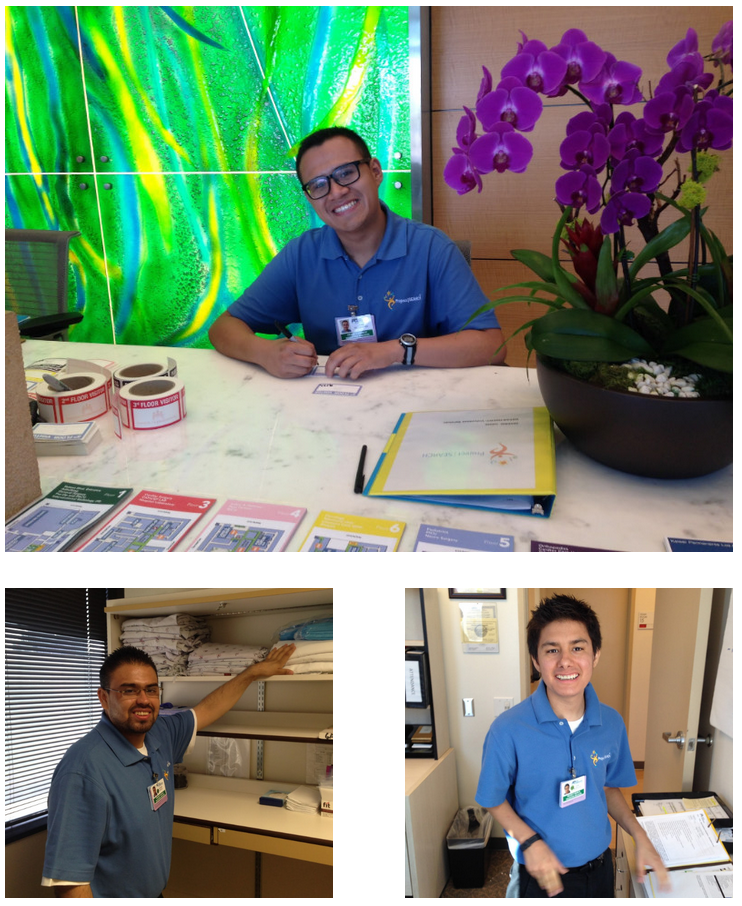
Kaiser Permanente Los Angeles Medical Center has Partnered with Lanterman Regional Center, LAUSD and Pathpoint to Bring Project SEARCH to Their Medical Campus
Top photo is Jaime Rodriguez; bottom left photo is Adrian Garcia; and bottom right photo is Erick Morales. All 3 are Los Angeles Unified School District students participating in Project SEARCH and are supported by LAUSD Special Education Teacher Lisa Divers.
Photos taken by LAUSD Special Education Teacher Lisa Divers
View more photos
About Project SEARCH
Project SEARCH is a program for young adults with disabilities to learn job skills through unpaid internships. The interns are in their last year at LAUSD and they will participate in three 10-week internships throughout various Kaiser/Sunset departments such as OB/GYN, Ambulatory Services and Volunteer Services.
The goal for Project SEARCH interns is to gain valuable work experience that will lead to paid employment after graduation. Recruitment for students for the 2016-17 school year will begin soon.
LAUSD students interested in finding out more about Project SEARCH should speak with their teacher or their service coordinator at Lanterman.
For general information about Project SEARCH visit their Web site.
All About Autism BrainNet
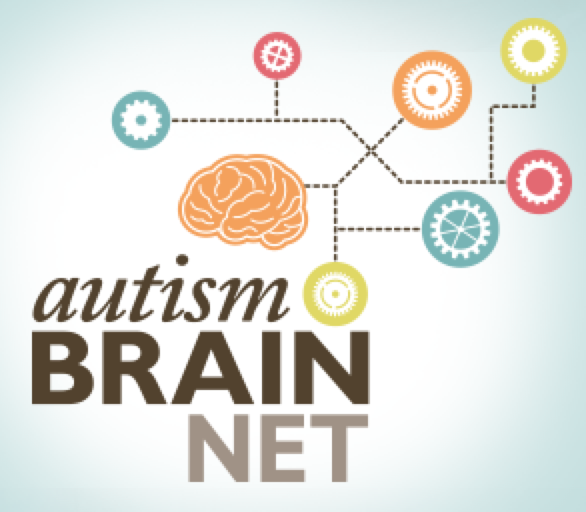
It Takes Brains ...to Solve Autism
What is Autism BrainNet?
Autism BrainNet is a new network of four university-based sites across the country that have come together to make brain donation both easier and more useful for future research. Brain donations to any of these sites will contribute to a common pool that will facilitate research by the best autism researchers in the world.
Why is Autism BrainNet Important?
Autism is a disorder of brain development. In order to make progress in all areas of autism research, scientists need to study brains. Understanding what is different about the genetics or structure of the brain will give autism researchers essential information to develop better treatments and ultimately prevent the debilitating symptoms of autism.
Read more to learn how donations are used and how you can help
Making Ornanments for the State Capitol Tree

Breakout the Glitter, Glue Guns and Tissue Paper - It's Time to Get Crafty and Start Making Ornaments for the State Capitol Tree
For more than 20 years, ornaments made by persons with developmental disabilities have adorned the state tree during the holidays. The Department of Developmental Services (DDS) has been asked once again to participate in the official State Capitol Tree Lighting Ceremony, which will take place in early December.
DDS is requesting ornaments from regional center clients to decorate the tree. If you or your program/agency would like to make and donate one or more ornaments, please check out the ornament guidelines and shipping instructions.
Ornaments must be received by November 16, 2015
DDS Director Santi Rogers to Retire Effective December 1
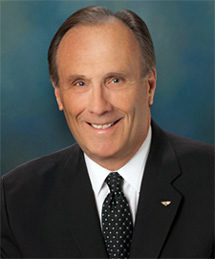
STATE CAPITOL UPDATE:
DEPARTMENT OF DEVELOPMENTAL SERVICES DIRECTOR SANTI ROGERS TO RETIRE EFFECTIVE DECEMBER 1
Surprise Announcement Made by California Health and Human Services Agency Secretary Diana Dooley At the Beginning of the Developmental Services Task Force Meeting – Search for Replacement Will Get Underway – Dooley and Advocates Praise Work and Commitment of Rogers
[Photo of Santi Rogers, Director of the Department of Developmental Services, March 2015 (Marty Omoto Photo)]SACRAMENTO, CA [BY MARTY OMOTO, CDCAN LAST UPDATED 10/28/2015 11:40 AM] – Santi Rogers, Director of the Department of Developmental Services will retire from state service, effective December 1, 2015. The surprise announcement was made by California Health and Human Services Secretary Diana Dooley at the beginning of the California Health and Human Services Agency Developmental Services Task Force meeting Wednesday morning, who praised the commitment and work of Rogers. She thanked Rogers, widely respected for his long career working for the rights of children and adults with developmental disabilities, noting that he ended up serving beyond his one year commitment as director of the Department of Developmental Services. Task force members and the audience in the room gave Rogers a strong ovation acknowledging his lifelong work.
Secretary Dooley said that Santi Rogers “…is finally going to actually take his retirement. It is a great disappointment to me, but approaching that age myself, I am very appreciative how well earned this is. Santi was ready to do this two years ago” but that because of his commitment to this community, “…he stepped up and said he would help us move through the transition that we were embarking on at that time two years ago…”
She noted that Rogers “…agreed to serve for a year and we have wrung two years out of him. And believe, he has been through the wringer. This is very hard work we are doing together,” adding that “he has a life and I respect that ever so much.”
Rogers, whose appointment was announced January 14, 2014, took office in March 3, 2014, He was confirmed by the State Senate in February 17, 2015 by a vote of 36 to 0. Rogers succeeded Terri Degadillo who retired from state service in December 2013.
No replacement has yet been selected and a search for a new director will be underway, with Secretary Dooley encouraging task force members and members of the audience to submit their ideas for a “generation of new leadership”. Dooley said that given the short time frame that it was “doubtful” that Rogers’ replacement would be decided by his retirement date of December 1st but that “interim leadership” possibly California Health and Human Services Agency Under Secretary Michael Wilkening, would be put in place as it was before when Delgadillo, the previous director before Rogers, retired from state service two years ago.
The Department of Developmental Services is an agency under the California Health and Human Services Agency, serving over 296,000 children and adults with developmental disabilities through the 21 non-profit regional centers and a network of community-based organizations and individuals who provide services and supports. The latest budget for the department in the 2015-2016 State Budget is over $5.9 billion ($3.5 billion of that is State general funds), an increase of $456.7 million above the last year’s 2014-2015 State Budget (an increase of 8.3%).
Children and adults with developmental disabilities may also be eligible for other services administered by other state agencies, including In-Home Supportive Services (IHSS), intermediate care facilities funded by Medi-Cal, Medi-Cal health benefits, Medicare health benefits, SSI/SSP (Supplemental Security Income/State Supplemental Payment) grants, Medicaid Waiver Personal Care Services, community-based adult services, foster care, adoption assistance, special education, Early Start, and more.
SECRETARY DOOLEY PRAISED ROGERS COMMITMENT FOR “ALL THAT YOU HAVE DONE & INSPIRED US TO DO…”
Dooley praised Rogers saying that he in “…so many ways embodied the decades of commitment that created the Lanterman Act,” and that she was “…deeply grateful and appreciative” for all that “you have done and all that you have inspired us to do…”
Rogers, in response, playfully looked around the table where he sat next to Secretary Dooley, as if trying to find something and then held up his copy of the Lanterman Developmental Disabilities Services Act book that contains the landmark California civil rights act for people with developmental disabilities - the only state in the nation to have such protections for people with developmental disabilities. The gesture caused a round of warm and affectionate laughter, because everyone knew that was his signature opening to nearly every speech he has given to countless audiences through the years across the State. Now he was holding the Lanterman Act booklet at his last meeting of the Developmental Services Task Force as director of the Department of Developmental Services.
He recalled the commitment of parents and families who helped to push the passage of the historic civil rights act for people with developmental disabilities who told lawmakers 45 years ago that “we are here to speak for justice” to bring the “essence of a better life” for their children. The landmark act was authored by Republican Assemblymember Frank Lanterman, passed by a then Republican controlled Legislature, and signed into law by then Governor Ronald Reagan.
Rogers spoke of his father when he took him to visit Porterville Developmental Center when he was 12 years old, and how that experience of seeing thousands of children and adults with developmental disabilities residing there changed his life. He said he was “…honored to be a part of the service system” that has served so many people and that this was a “forever relationship”.
Members of the task force around the table and members of the audience all praised and thanked Rogers for his work and commitment to the lives of people with developmental disabilities.
ROGERS BORN AND RAISED IN FRESNO – SERVED PREVIOUSLY AS DIRECTOR OF SAN ANDREAS REGIONAL CENTER
Born and raised in Fresno, California, Rogers had long experience in state government dating back to Governor Brown’s first administration, working 27 years within the Department of Developmental Services as a Special Education Teacher; Director of Title I Early Education Program; Program Director; Deputy Director for the division in the department that oversaw regional centers.
He served as an Director at four Developmental Centers: Stockton (1976), Sonoma (1985), Porterville (1987) and Agnews (1992). Rogers retired from his first tour of duty in State service in 1995. From 1995 to 2014, for over 19 years, Rogers served as executive director of San Andreas Regional Center covering Monterey, San Benito, Santa Clara and Santa Cruz counties, before his temporary return to State service as Director of the Department of Developmental Services in 2014. .
San Andreas Regional Center is one of 21 non-profit agencies under contract with the Department of Developmental Services to provide assessments, determine eligibility and coordinate regional center funded services for over 296,000 children and adults with developmental disabilities, including infants and toddlers in California’s early intervention program called “Early Start”.
CDCAN - MARTY OMOTO YOUTUBE CHANNEL
A CDCAN (Marty Omoto, family member and advocate) youtube channel was set up and has several videos dealing with current – and previous state budget issues, disability and senior rights, and advocacy.
To see the current videos, including March 2014 San Andreas Regional Center Aptos Legislative Breakfast, January 2014 panel discussion on services for adults with autism spectrum and related disorders in Palo Alto, and older videos including video of April 2003 march of over 3,000 people with developmental disabilities, families, providers, regional centers and others from the Sacramento Convention Center to the State Capitol (to attend and testify at budget hearing on proposed massive permanent cuts to regional center funded services, go to the CDCAN (Marty Omoto) Channel at: https://www.youtube.com/channel/UCEySEyhnr9LQRiCe-F7ELhg<http://cdcan.us4.list-manage.com/track/click?u=6d5ff1c64c58f56239b63cf14&id=b3788cf710&e=bb1b2a9da5>
More videos – including new current videos (an interview with longtime advocate Maggie Dee Dowling is planned, among others) – plus archive videos of past events – will be posted soon.
CDCAN DISABILITY-SENIOR RIGHTS REPORT
CALIFORNIA DISABILITY-SENIOR COMMUNITY ACTION NETWORK
OCTOBER 28, 2015 - WEDNESDAY EVENING
Advocacy Without Borders: One Community – Accountability With Action
CDCAN Reports go out to over 65,000 people with disabilities, mental health needs, seniors, people with traumatic brain and other injuries, people with MS, Alzheimer's and other disorders, veterans with disabilities and mental health needs, families, workers, community organizations, facilities and advocacy groups including those in the Asian/Pacific Islander, Latino, American Indian, Indian, African-American communities; policymakers, and others across the State.
Sign up for these free reports by going to the CDCAN website. Website: www.cdcan.us<http://cdcan.us4.list-manage1.com/track/click?u=6d5ff1c64c58f56239b63cf14&id=2aa75a140f&e=bb1b2a9da5>
HELP IS NEEDED TO CONTINUE CDCAN (SEE BELOW)
To reply to THIS Report write:
Marty Omoto (family member & advocate) at martyomoto@rcip.com<mailto:martyomoto@rcip.com> or martyomoto@att.net<mailto:martyomoto@att.net> [new email - will eventually replace current martyomoto@rcip address] Twitter: martyomoto
Office Line: 916-418-4745 CDCAN Cell Phone: 916-757-9549
PLEASE HELP!!!!!!
OCTOBER 28, 2015 - WEDNESDAY EVENING
HELP CDCAN CONTINUE ITS WORK
CDCAN Townhall Telemeetings, CDCAN Reports and Alerts and other activities cannot continue without YOUR help. To continue the CDCAN website and the CDCAN Reports and Alerts sent out and read by over 65,000 people and organizations, policy makers and media across the State, and to continue and resume CDCAN Townhall Telemeetings, trainings and other events, please send your contribution/donation (please make check payable to "CDCAN" or "California Disability Community Action Network" and mail to:
CDCAN
1500 West El Camino Avenue Suite 499
Sacramento, CA 95833
Many, many thanks to all the organizations and individuals for their continued support that make these reports and other CDCAN efforts possible!
Copyright © 2015 - Can be posted or re-produced without permission if full credit is given to CDCAN
Our mailing address is:
Marty Omoto - martyomoto@rcip.com<mailto:martyomoto@rcip.com> or martyomoto@att.net<mailto:martyomoto@att.net>
Promotora Project Family Graduation
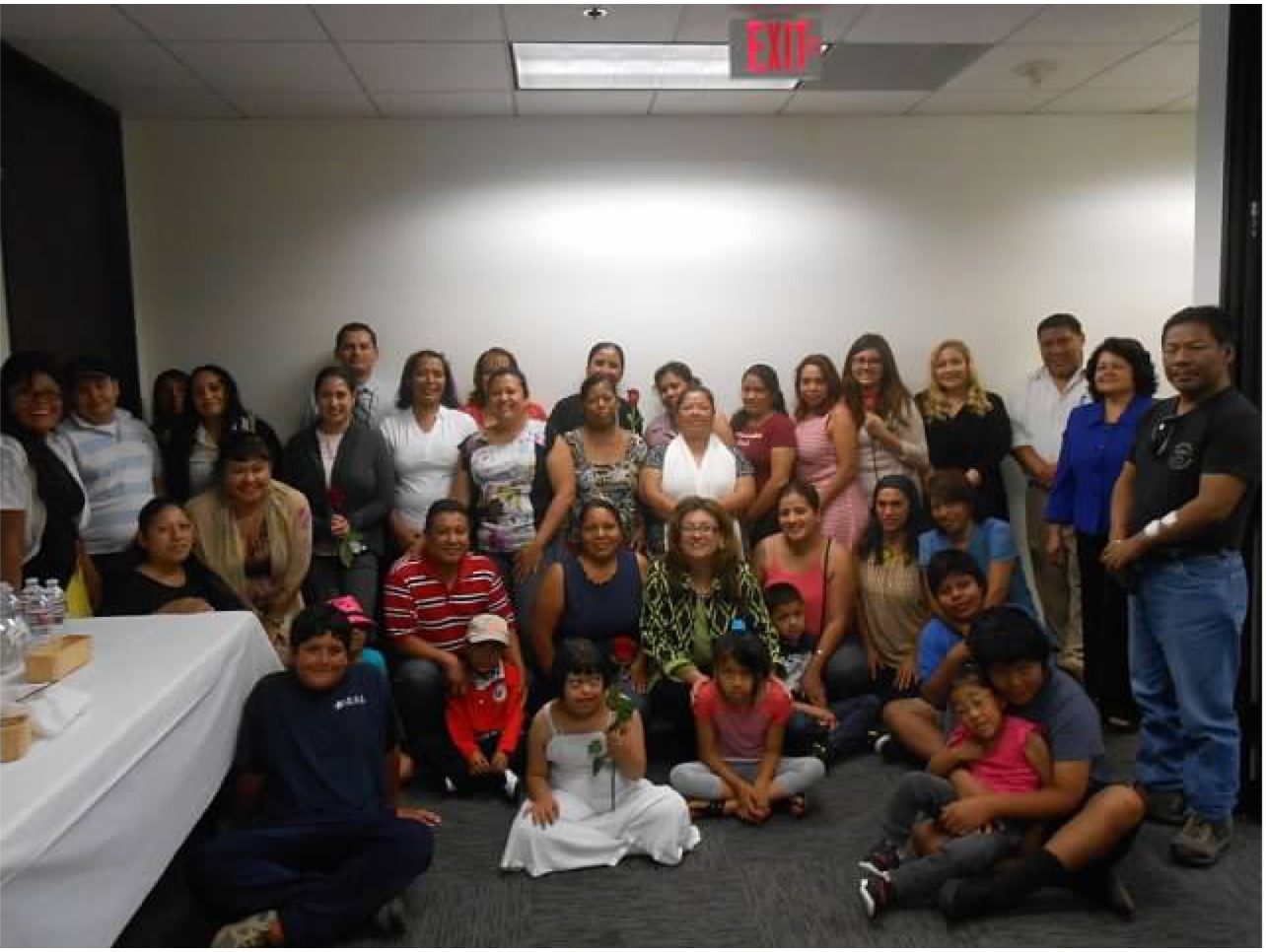
Lanterman recently celebrated the first group of families graduating from the Center's pilot project with Esperanza Community Housing.
Called the Promotora Project, it is the first of its kind among the 21 regional centers in California.
The goal of the Promotora Project is to help families increase access to services in their community, increase advocacy skills, and improve their understanding of their child’s special needs.
Congratulations to all the families who participated.
Files
Kirk is a Shining Example of Life After the Developmental Center
.jpg)
Sometimes the unremarkable is remarkable - like going out for dinner, taking a trip to Target, or even decorating your own tree at the holidays. It's something many of us take for granted, but for Kirk, officially Lanterman's last client to move out of Lanterman Developmental Center in December 2014, after living there since 1997, these are experiences to be cherished.
Kirk He moved into the Verdugo 1 home in Burbank and his service coordinator, Jenny Arellano, shares, "Kirk has taken pride in and ownership of his home. He has made connections with his staff and has been heard calling his Direct Service Professional his 'brother.' Kirk has made significant improvement with his ambulation since his arrival at his new home; this is a result of his DSP providing constant encouragement to use his lower extremities. He is now able to move more efficiently throughout his home with support from his walker and on occasion he will even make short trips around his home without support from an assistive device."
Dorothy’s 77th Birthday Luau
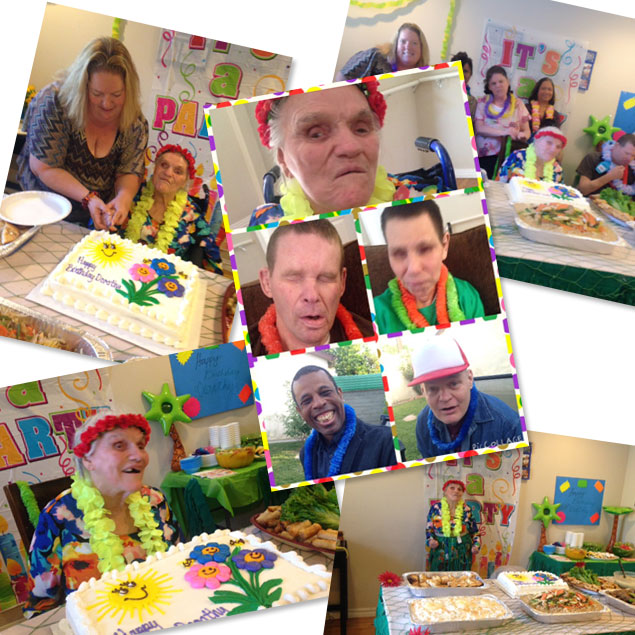
For nearly 70 years, Dorothy lived at Lanterman Developmental Center. In July 2010, she moved to Easter Seals Frederic Home, where she now resides with two other housemates.
According to her service coordinator, Jenny Arellano, "Dorothy seems to like having her own room and living in a quieter environment. She is the 'queen' of the house as she is the only female resident. And the staff is very attentive and caring. Dorothy enjoys being pampered and loves getting her makeup done and her hair coifed and is regularly treated to 'spa days.''' Staff recently threw Dorothy a marvelous luau to celebrate her 77th birthday.
Dorothy also enjoys spending time out in the community. Over this past year she has visited Universal Studios, Malibu Beach and ate at Duke’s Diner. She also visited Beverly Hills and went on tour of famous stars homes.
Ramona’s Poem

When Lusine Gambaryan, SLS Assistant Program Director at InClusion Services, recently stopped by to visit Ramona, Ramona shared a poem she had written entitled "A Poem About Ramona." Ramona asked that they read it together, as it was written just after a particularly difficult experience that she went through and Lusine shares, "This touched my heart that Ramona was courageous enough to write out her thoughts and express them on paper."
Ramona is a young adult who has successfully transitioned from living in a state developmental center to living in her own apartment with supports. She is a member of Lanterman's Client Advisory Committee as well.
Lusine adds, "After reading this, I am confident that Ramona is trying very hard to overcome her daily challenges. She also understands that with the help of her support circle she has come a long way to turn around at this."
Information and Resources are Only a Click, E-mail or Phone Call Away
.jpg)
A few weeks ago, Lanterman's Koch-Young Resource Center (KYRC) received an e-mail at Help Desk asking for information regarding epilepsy. The information was provided, and then not too long thereafter, the KYRC received an update. It turns out the requester was a high school student who has epilepsy and lives in Wyoming - Gabbie Marie.
Rose Chacana, director of the KYRC, shares, "She found us on her own, researched the Lanterman Web site and used the information she gathered to create a school project designed to increase epilepsy awareness. I really like her initiative and she made very good use of the Web site and KYRC resources, all while residing in another state. We touch many lives..."
Gabbie Marie's project was presented at the Wyoming State FCCLA (Family, Career and Community Leaders of America) in Cheyenne. Her presentation and project placed bronze in the statewide Illustrative Talk competition. And while she didn't make it to the Nationals, her story is a shining example of what can be accomplished with the information and resources that are available with only a click, e-mail or phone call.
Nurturing Staff at Casa de Adora Help Two Brothers from Lanterman Developmental Center
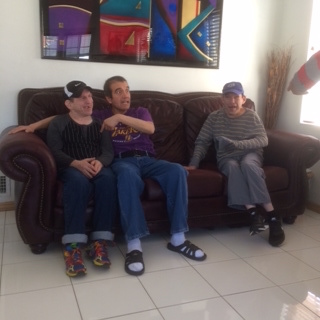
Nurturing Staff at Casa de Adora Help Two Brothers from Lanterman Developmental Center Find Their “Voice” and Express Themselves Positively
Eight years ago, brothers John and Daniel, who had spent much of their adult lives at Lanterman Developmental Center, moved into Casa de Adora. And contrary to all of the naysayers who argued keeping adults with developmental disabilities like John and Daniel in the developmental centers was better for them, with nurturing and support from the staff at Casa de Adora, John and Daniel have all but disproven this.
It’s not to say that it didn’t take time to achieve the marked progress that can be seen in their lives and the daily lives of the other residents at Casa de Adora, but they are a case in point example of the breakthroughs that can be achieved when clients are provided with ways in which to find their “voice” and express themselves positively.
“When they first came to Casa de Adora,” recalls Julio Vicente, a QA Specialist in Lanterman’s Community Services department, “the two brothers had uncontrollable behaviors, including hitting, kicking, head banging, yelling and spitting, and they didn’t like to be around others, especially people they didn’t know. For Daniel, these were the ways he used to communicate as he didn’t’ have any other means or know what else to do, and John would also retreat to his room and spend hours in his chair alone.”
Fast forward to Daniel’s most recent birthday celebration, and the two brothers can be seen celebrating with the Casa de Adora staff and the other two residents – Jaime and Mario. Julio adds, “Daniel no longer exhibits any of the above behaviors, enjoys hanging out and has learned some basic sign language to communicate with others. John, who never came out of his room and did not want to participate in any activities, now spends time in the living room watching television with his brother and his peers, partakes in meals with the rest of the residents, and has even learned to smile and attempt to communicate through sign language as well.”
Mario and Jaime have also made leaps and bounds since moving in. The staff have worked very closely with Mario and his doctors on medication reduction, and Jaime has gone from being introverted to talking, singing and making eye contact with his peers and with people in general.
Julio adds, “This is all very endearing to me, because I saw them when they first got to the home and I’m looking at a totally different and amazing picture now. Wonderful to see!”
File
Grassroots Day 2015 ~ Sacramento
.jpg)
Last week was Grassroots Day in Sacramento, and Lanterman board member and parent Karla Garcia, along with Enrique Roman, associate director of Client and Family Services, and Karen Ingram, director of Community Services spent the day in Sacramento visiting with members of the Legislature and their senior staff to build support for the much needed 10% funding increase for regional centers and providers. They shared how key this increase is for providers as far as offering competitive wages, hiring quality staff, reducing turnover and in the end their ability to stay in business.
Photos (clockwise from top left): Enrique, Karen and Karla with Senator Holly Mitchell (at right), an advocate for children and regional centers who was instrumental in restoring Early Start last year; Karla with the Golden Bear; and Karen and Enrique with Tina Andolina (center), Senior Policy Consultant to Senator Ben Allen
Mark Your Calendars for the Special Olympics Southern California 2015 Summer Games

The Special Olympics Southern California 2015 Summer Games are coming to California State University, Long Beach on June 13 and 14. The games are free and open to the public and competitions include aquatics, athletics, basketball, bocce, golf and gymnastics. Learn more at www.sosc.org/summergames and come out and show your support for more than 1,100 athletes from all over Southern California.
File
Uniform Holiday Schedule and Half-Day Billing Requirements No Longer In Effect

On February 13, 2015, a federal court issued a ruling that the Uniform Holiday Schedule and Half-Day Billing requirements put into effect in 2009 could not be enforced until such time as the state had obtained approval for the requirements from the Centers for Medicare and Medicaid Services (CMS). Essentially, the Court said the Department of Developmental Services cannot implement Uniform Holiday Closures without prior approval from CMS, so they are no longer in effect. What this means for regional center clients and families is that programs and transportation services that were impacted by these closures MAY provide services on March 31 (what was to be the next Uniform Holiday Closure date), and on all other future UHC dates. Families should, however, confirm with the program that they will be open that day.
The Court also said that DDS cannot implement half-day billing requirements for day programs without prior approval from CMS, so this is no longer in effect as well. This applies to Activity Centers, Adult Development Centers, Behavior Management Programs and other look-alike day programs.
File
The Time Has Come - Let Your Voices Be Heard, Show Your Support for a 10% Funding Increase

The time has come - get informed and then let your voices be heard and show your support for a 10% funding increase for the developmental services system - before it's too late.
Get Informed - Read ARCA's Report and Senator Beall's New Letter
ARCA has released its newest report, titled On The Brink Of Collapse, meant to provide policy-makers, advocates, and the citizens of California an understanding of the crisis engulfing our state’s developmental services system.
ARCA hopes this report will increase your understanding of the fiscal challenges California’s developmental services system faces in fulfilling its promise to individuals and their families and the urgent need for both short and long-term Budget solutions, which ARCA and the other Lanterman Coalition members support, to stabilize and advance the system.
On a separate front, Senator Beall has authored a second letter itemizing various harms done to the developmental services system, and specifically asking for the 10% POS/OPS increase. He is requesting that other legislators sign on. Read a copy of his letter and use it to inform your personal comments and testimony.
Take Action - Attend the March 4 Capitol Rally or E-mail Your Testimony for the Hearing
The Lanterman Coalition's members continue to push for funding reform to fix our developmental services system, but they need our help. If you can, join them at the State Capitol in Sacramento for a rally at 11 a.m. on Wednesday, March 4 or come testify and show your support for our system at a Budget hearing, in room 4202, at 1:30 p.m. that afternoon.
Now is the time to advocate for our system and your services. This is your first, and best chance to tell the Legislature why your service system needs a 10% increase now, and long-term funding reform.
Can't make it, but still want your voice to be heard? Please e-mail your personal, honest and respectful testimony and comments to "The Honorable Tony Thurmond," chair of the Assembly Budget Subcommittee #1 on Health and Human Services. The email address is: assemblymember.thurmond@assembly.ca.gov. And be sure to include your mailing address at the bottom to ensure your testimony can be properly accepted.
Read more about what you can do to take action in ARCA's latest newsletter.
Files
DDS SafetyNet ~ Don’t Get Measles - Get Vaccinated

California is having a measles outbreak. You can protect yourself and others from measles by getting vaccinated.
What Is Measles?
Measles is a disease that you can catch from other people. It can cause cold-like symptoms, fever, and a skin rash. It can make you really sick. Measles: What You Need to Know
How Do You Prevent Measles?
There is a shot, also called a vaccine, that keeps you from getting measles. Children and adults should have a Measles Vaccine.
What Happens When You Get a Shot?
Getting a measles shot is quick and easy. Learn what to expect by reading Shots Can Keep You Healthy.
For more useful tips on vaccinations, visit the DDS SafetyNet.
File
DDS SafetyNet ~ Check Up on Your Preventive Health

The SafetyNet has brand new tips and tools to help you be prepared for your annual checkup, preventive health screenings, and vaccinations to help you stay healthy. Tips to read before your checkup:
Tools to Complete for Your Checkup:
For more information on annual checkups, health screenings, and more, visit the DDS SafetyNet.
File
Governor Releases Proposed Budget for 2015-16; Does Not Address Need for 10% Funding Increase

Governor Brown has presented the proposed Governor’s Budget for fiscal year 2015-16. The priorities he outlined included maintaining a balanced budget and rainy day fund to protect against future recessions, and paying down debt. He noted that to accomplish this, the Governor’s Budget for next year is “basically flat” with modest increases in some areas. He highlighted the increase to Medi Cal to provide health care to low income Californians, and increased spending for education as supported by a majority of voters in the election last November.
Proposed funding for Developmental Services was increased $452 Million in 2015-16, and $159 million to adjust the current 2014-15 budget, to address growth in caseload and service utilization. But the proposed budget does not address the need for an immediate 10 percent across-the-board funding increase
The budget for Social Services proposes to restore the 7 percent across the board reduction of IHSS service hours, effective July 1, 2015. Effective January 2015, maximum SSI/SSP grant levels are $881 per month for individuals and $1,483 for couples, due to federal Cost of Living Adjustment funding.
File
DDS SafetyNet ~ Stay Healthy This Winter

It's a new year, and a new you. Keep yourself healthy during winter flu season. Watch these videos to learn what you can do to stay healthy.
Get a Flu Shot
Getting a flu shot can help protect you from the flu. Watch the video below to hear from self-advocates who got their flu shot. The video also includes more tips on how to stay healthy this winter.
Wash Your Hands
Wash away germs on your hands that can make you sick. Learn the best way to wash your hands by watching this video.
More on Staying Healthy
There are many tips on how to stay healthy this winter. Use this neat poster to remind you of these tips. Click here for a copy you can print. Don't forget to share it with your supporters and your friends.
For more tips on staying healthy, visit the DDS SafetyNet.
File
CDCAN State Capitol Update: Self-Determination Progrmam Funding Proposal Submitted to Fed. Gov’t

STATE CAPITOL UPDATE: “SELF DETERMINATION” PROGRAM TAKES MAJOR STEP FORWARD WITH FUNDING PROPOSAL SUBMITTED TO FEDERAL GOVERNMENT BY BROWN ADMINISTRATION
SACRAMENTO, CA [CDCAN LAST UPDATED 01/08/2015 – 09:00 AM] – A new program that is meant to give eligible persons with developmental disabilities in California more flexibility, control, and choices on their services and supports called “self determination” moved a major step forward toward implementation with the submission of a funding proposal to the federal government by the Brown Administration last week on December 31st. The State law that authorizes the Self Determination Program requires approval of matching federal funds in order to be implemented in California.
While the submission of the proposal to the federal government is a significant step, the normal review process could take several months or even longer before expected approval is given by the federal government and actual implementation of the program can begin in the State.
Advocates and policymakers in the Legislature meanwhile have applauded the work of the Department of Developmental Services in bringing together stakeholders that resulted in the final proposal submitted, though some have raised concerns about the need for next steps to prepare the State for eventual full scale implementation once federal approval of the proposal is given.
The voluntary new program, which would be initially limited to a Statewide total of 2,500 eligible persons with developmental disabilities phased in over three years (from the date of actual implementation) in all 21 regional centers, was authorized in legislation – SB 468 by Senator Bill Emmerson (Republican – Riverside, 23rd State Senate District), – that Governor Brown signed into law on October 9, 2013 (see below for links to the bill as signed into law).
The Department of Developmental Services, the state agency that oversees the funding of services and supports to over 250,000 eligible children and adults with developmental disabilities that is coordinated through the 21 non-profit regional centers who in turn contract with local community-based organizations and individuals to provide those services, said last week that a copy of the proposal would be posted soon on the department’s webpage at: http://www.dds.ca.gov/sdp/SDPUpdates.cfm<http://cdcan.us4.list-manage.com/track/click?u=6d5ff1c64c58f56239b63cf14&id=a8be95347a&e=bb1b2a9da5> [CDCAN will send out notice when the proposal sent to the federal government is posted on the department website and also when it is posted on the federal government website for public comment]
The department, under director Santi Rogers, acknowledged the “significant efforts” of a stakeholder advisory group that helped to craft the proposal during the past year in numerous meetings and phone conferences. The first meeting of that stakeholder advisory group was convened a year ago November 2013 by department director Terri Delgadillo just before her retirement from state service in December and continued in regular meetings after that headed by Nancy Bargmann, deputy director of community services, Jim Knight and other senior department officials. That first meeting last year was also attended briefly by former Senator Bill Emmerson (Republican – Riverside, 23rd State Senate District), who authored the Self Determination Program legislation that became law.
The proposal was developed and submitted as a Medicaid Home and Community Based Services waiver application to the federal Centers on Medicare and Medicaid Services (CMS), the federal agency that oversees nationwide the Medicare and Medicaid programs. In California the Medicaid funded programs are called “Medi-Cal”. A “waiver” granted by the federal government to a state authorizes that state to implement and test out new or innovative ways to provide Medicaid funded service or program that normally under current federal Medicaid laws would not be allowed.
The legislation was sponsored by the Autism Society of Los Angeles and Disability Rights California (DRC), who organized a major statewide conference November 7-8, 2014 in Los Angeles to help kick off the implementation of the Self Determination Program that drew over 400 people with developmental din Los Angeles sabilities and family members from across the State including senior officials from the Brown Administration and representatives and executive directors of several regional centers and advocacy organizations.
ORIGINAL SELF DETERMINATION PILOT PROGRAM STARTED IN 1999 STILL CONTINUES
A previous self determination pilot program, funded only with state dollars, was authorized in 1998 by SB 1038 (Chapter 1043, Statutes of 1998) authored by then Senator Mike Thompson (Democrat – Eureka) that implemented in 1999 a three year pilot in five regional centers with about 200 persons with developmental disabilities. That pilot program – which is significantly different from the Self Determination Program proposal submitted December 31, 2014 to the federal government - continues today and has largely been considered a success by those who participated in the program. Over the coming months, the Department of Developmental Services will finalize and announce the process for those remaining participants in the original 1999 pilot program in transitioning to the new Self Determination Program, assuming approval of the proposal for funding by the federal government.
A different model of self determination proposed by the Schwarzenegger Administration, called “Self Directed Services” was authorized as part of the 2005-2006 State Budget (in a budget trailer bill, AB 131, Chapter 80, Statutes of 2005) though was never implemented in the State. The proposal was considered controversial by many advocates who viewed that version of self determination as largely a cost savings measure to reduce access to services that included too many restrictions and barriers. Other advocates supported that proposal believing it was a reasonable first step in the right direction. While a proposal for Medicaid funding was eventually submitted, no further action was taken on it either by the federal government or by the State and is considered “dead”.
NEXT STEPS
FEDERAL REVIEW OF APPLICATION: The federal Centers on Medicare and Medicaid Services (CMS) has 90 days from the date the application (or proposal) was submitted to review the application and take one of three actions: approve; deny; or request additional information. It is likely the Centers on Medicare and Medicaid Services (CMS) will request additional information to clarify information in the application – something that happens to virtually every proposal and application submitted to the agency - that in turn extends the review period. The actual proposal submitted from California will be posted not only on the Department of Developmental Services website, but also on a specific webpage of the Centers on Medicare and Medicaid Services that will include the status of the application and ways to make public comments directly to the federal Centers on Medicare and Medicaid Services (CMS) on the proposal. [CDCAN will send out the link to this page once the application is posted – as of January 8, 2015 neither site has yet posted the proposal]
ENROLLMENT: No enrollment into the new Self Determination Program can happen until approval of federal funding is obtained, which in turn would trigger the official implementation of the program. The Department of Developmental Services – with stakeholder advisory group members and others – has been working to develop and finalize the process of enrollment into the program, including what steps regional centers and individuals and families need to take toward enrollment.
TRAINING AND OUTREACH: The Department of Developmental Services said last week that while review of the proposal submitted to the federal government is underway, work will continue on the development of training and informational materials regarding the Self Determination Program.
SB 468 BY FORMER SENATOR EMMERSON WAS SIGNED INTO LAW LAST YEAR AUTHORIZING THE PROGRAM
The Self Determination Program was authorized in legislation, SB 468, authored by former Senator Bill Emmerson (Republican – Riverside, 23rd State Senate District), who resigned from the State Senate last December 1, 2013 because of “my passion has waned” to continue service in the Legislature. The bill was passed on September 11, 2013 by the Assembly by a vote of 78 to 0 and the State Senate by a vote of 39 to 0. Governor Brown signed the measure into law on October 9, 2013 (Chapter 683, Statutes of 2013).
For PDF Document copy (14 pages) of the bill as signed into law:
http://www.leginfo.ca.gov/pub/13-14/bill/sen/sb_0451-0500/sb_468_bill_20131009_chaptered.pdf<http://cdcan.us4.list-manage.com/track/click?u=6d5ff1c64c58f56239b63cf14&id=99b6e8fb6d&e=bb1b2a9da5>
For HTML version of the bill as signed into law:
http://www.leginfo.ca.gov/pub/13-14/bill/sen/sb_0451-0500/sb_468_bill_20131009_chaptered.htm<http://cdcan.us4.list-manage.com/track/click?u=6d5ff1c64c58f56239b63cf14&id=9e983db48e&e=bb1b2a9da5>
FREQUENTLY ASKED QUESTIONS AND ANSWERS
The following are questions and answers from the Department of Developmental Services webpage regarding the self determination program (CDCAN made certain minor edits to define abbreviations used):
Q: What is the Self Determination Program?
A: As authorized in Welfare and Institutions Code, Section 4685.8, "the Self Determination Program (SDP) is a voluntary delivery system consisting of a mix of services and supports, selected and directed by a participant through person-centered planning, in order to meet the objectives in his or her Individual Program Plan (IPP). Self-determination services and supports are designed to assist the participant to achieve personally defined outcomes in community settings that promote inclusion."
Q: When does the Self Determination Program (SDP) start?
A: The program will start once it is approved for federal funding. The Department of Developmental Services is working with stakeholders to draft a Medicaid Home and Community-Based Services Waiver application that will be submitted for approval to the Centers for Medicare and Medicaid Services no later than December 31, 2014. Upon approval of the Waiver application, the Self Determination Program (SDP) will be implemented for up to 2,500 participants during the first three years. After this three year phase-in period, the program will be available to all consumers.
Q: How can I keep updated on the progress of the Self Determination Program (SDP)?
A: Updates will be posted as they become available on the Self Determination website. If you want to be notified when updates are made, email sdp@dds.ca.gov<mailto:sdp@dds.ca.gov> and ask to be included on the update notification list.
Q: Who is eligible for the Self Determination Program (SDP)?
A. An individual must meet the following eligibility requirements:
- Has a developmental disability and currently receives services from a regional center or is a new consumer of a regional center;
- Agrees to specific terms and conditions, which include but are not limited to, participation in an orientation to Self Determination Program (SDP), working with a “Financial Management Services” (FMS) entity, and managing Self Determination Program (SDP) services within an individual budget amount.
- An individual who lives in a licensed long-term health care facility (i.e., a Skilled Nursing Facility, Intermediate Care Facility) is not eligible to participate in the Self Determination Program (SDP). If someone lives in one of these facilities and is interested in the Self Determination Program (SDP), he or she can request that the regional center provide person-centered planning services in order to make arrangements for transition to the Self Determination Program (SDP), provided that he or she is reasonably expected to transition to the community within 90 days.
Q: What if participants are happy with their current service delivery program and do not wish to enroll in the Self Determination Program (SDP)?
A: Enrollment in the Self Determination Program (SDP) is completely voluntary. Just like any other program offered under the Lanterman Developmental Disabilities Services Act in California, an individual chooses what is best for him or her. An individual may choose to participate in, and may choose to leave, the Self Determination Program (SDP) at any time.
Q: How much responsibility will participants or their family have if they choose to participate in the Self Determination Program (SDP)?
A: The participant will need to develop a person-centered plan and select individuals or members from their planning team to help implement the plan. The participant will also need to choose a Financial Management Services (FMS) entity that will work with him or her to monitor their individual budget.
Q: What are Financial Management Services (FMS)?
A: Financial Management Services (FMS) assist the participant to manage and direct the funds contained in the individual budget, and ensure that the participant can implement his or her Individual Program Plan (IPP) throughout the year. Financial Management Services (FMS) may include bill paying services and activities that facilitate the hiring of support workers for the participant.
Q: What is an individual budget?
A: It is the amount of money a Self Determination Program (SDP) participant has available to purchase needed services and supports.
Q: How does the individual budget amount get determined?
A: The individual budget is determined by the Individual Program Plan (IPP) team, and is based upon the amount of purchase of service (POS) funds used by the individual in the most recent 12-months. This amount can be adjusted, up or down, if the Individual Program Plan (IPP) team determines that the individual's needs, circumstances, or resources has changed. Additionally, the IPP team may adjust the budget to support any prior needs or resources that were not addressed in the Individual Program Plan (IPP).
Q: How does the individual budget amount get determined for an individual, who is either new to the regional center, or does not have a 12-month history of Purchase of Service (POS) costs?
A: For these individuals, the individual budget amount is determined by the Individual Program Plan (IPP) team, and is based upon the average Purchase of Service (POS) cost of services and supports, paid by the regional center, that are identified in the individual's Individual Program Plan (IPP). The average cost may be adjusted, up or down, by the regional center, if needed to meet the individual's unique needs.
Q: Are there restrictions on what the individual budget can be used for?
A: Yes, a participant can only purchase services and supports as described in the Self Determination Program (SDP) [Medicaid Home and Community Based Services] Waiver and in the Individual Program Plan (IPP). Services funded through other sources (e.g., Medi-Cal, schools) cannot be purchased with Self Determination Program (SDP) funds.
Q: If I choose to participate in the Self Determination Program (SDP), will I still have the same rights?
A: Yes, participants enrolled in the Self Determination Program (SDP) will have the same rights established under the traditional service model (e.g. appeals, eligibility determinations, all rights associated with the Individual Program Plan (IPP) process).
Q: How can someone learn more about the Self Determination Program (SDP)?
A: Interested participants, families, or others are encouraged to visit the Self Determination website (at www.dds.ca.gov/sdp<http://cdcan.us4.list-manage.com/track/click?u=6d5ff1c64c58f56239b63cf14&id=1c2ab4f427&e=bb1b2a9da5> ) to find out more information about the Self Determination Program (SDP). The site will be updated as more information is available.
Q: Can I enroll in Self Determination now?
A: The process for selecting and enrolling the 2,500 participants in the first three years has not been finalized. However, you can email (the Department of Developmental Services) sdp@dds.ca.gov<mailto:sdp@dds.ca.gov> to express your interest in the program and you'll receive notice of website updates on the progress of the Self Determination Program (SDP), including the enrollment process. Please include your name and/or the name of the person interested in enrollment and the regional center you are with in the email.
FOR MORE INFORMATION ABOUT SELF DETERMINATION PROGRAM
DEPARTMENT OF DEVELOPMENTAL SERVICES:
SELF DETERMINATION PROGRAM MAIN PAGE (INCLUDING WELCOME FROM DIRECTOR SANTI ROGERS):
http://www.dds.ca.gov/sdp/index.cfm<http://cdcan.us4.list-manage.com/track/click?u=6d5ff1c64c58f56239b63cf14&id=167e3666bb&e=bb1b2a9da5>
IMPLEMENTATION UPDATES:
http://www.dds.ca.gov/sdp/SDPUpdates.cfm<http://cdcan.us4.list-manage.com/track/click?u=6d5ff1c64c58f56239b63cf14&id=8e0b14401d&e=bb1b2a9da5>
FREQUENTLY ASKED QUESTIONS (Note: this was reproduced in full above):
http://www.dds.ca.gov/sdp/SDPFAQ.cfm<http://cdcan.us4.list-manage.com/track/click?u=6d5ff1c64c58f56239b63cf14&id=5fec876536&e=bb1b2a9da5>
CDCAN - MARTY OMOTO YOUTUBE CHANNEL
A CDCAN (Marty Omoto) youtube channel was set up and has several videos dealing with current – and previous state budget issues, disability and senior rights, and advocacy.
To see the current videos, including March 2014 San Andreas Regional Center Aptos Legislative Breakfast, January 2014 panel discussion on services for adults with autism spectrum and related disorders in Palo Alto, and older videos including video of April 2003 march of over 3,000 people with developmental disabilities, families, providers, regional centers and others from the Sacramento Convention Center to the State Capitol (to attend and testify at budget hearing on proposed massive permanent cuts to regional center funded services, go to the CDCAN (Marty Omoto) Channel at: https://www.youtube.com/channel/UCEySEyhnr9LQRiCe-F7ELhg<http://cdcan.us4.list-manage.com/track/click?u=6d5ff1c64c58f56239b63cf14&id=8ef6ffcb79&e=bb1b2a9da5>
More videos – including new current videos (an interview with longtime advocate Maggie Dee Dowling is planned, among others) – plus archive videos of past events – will be posted soon.
Advocacy Without Borders: One Community – Accountability With Action
CDCAN Reports go out to over 65,000 people with disabilities, mental health needs, seniors, people with traumatic brain and other injuries, people with MS, Alzheimer's and other disorders, veterans with disabilities and mental health needs, families, workers, community organizations, facilities and advocacy groups including those in the Asian/Pacific Islander, Latino, American Indian, Indian, African-American communities; policymakers, and others across the State.
Sign up for these free reports by going to the CDCAN website. Website: www.cdcan.us<http://cdcan.us4.list-manage2.com/track/click?u=6d5ff1c64c58f56239b63cf14&id=709d60e878&e=bb1b2a9da5>
To reply to THIS Report write:
Marty Omoto at martyomoto@rcip.com<mailto:martyomoto@rcip.com> or martyomoto@att.net<mailto:martyomoto@att.net> [new email - will eventually replace current martyomoto@rcip address] Twitter: martyomoto
Office Line: 916-418-4745 CDCAN Cell Phone: 916-757-9549
JE SUIS CHARLIE - “I AM CHARLIE”
PLEASE HELP!!!!!!
HAPPY NEW YEAR
JANUARY 8, 2015 THURSDAY
HELP CDCAN CONTINUE ITS WORK
CDCAN Townhall Telemeetings, CDCAN Reports and Alerts and other activities cannot continue without YOUR help. To continue the CDCAN website and the CDCAN Reports and Alerts sent out and read by over 65,000 people and organizations, policy makers and media across the State, and to continue and resume CDCAN Townhall Telemeetings, trainings and other events, please send your contribution/donation (please make check payable to "CDCAN" or "California Disability Community Action Network" and mail to:
CDCAN – NEW MAILING ADDRESS:
1500 West El Camino Avenue Suite 499
Sacramento, CA 95833
[replaces 1225 8th Street Suite 480, Sacramento, CA 95814]
Office Line: 916-418-4745 CDCAN Cell Phone: 916-757-9549 (replaced 916-212-0237)
Many, many thanks to all the organizations and individuals for their continued support that make these reports and other CDCAN efforts possible!
Petition the State House and Senate to Support the Developmental Disabilities Community
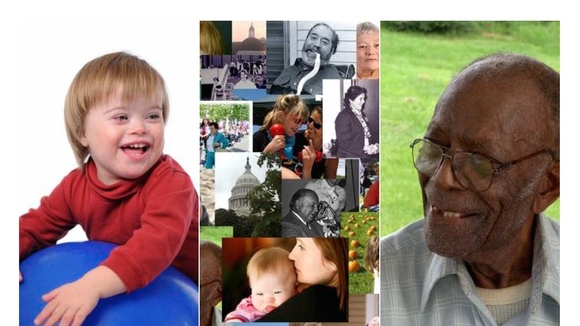
The developmental disabilities community needs help now. During the past ten years this system has endured over 50 cost cutting changes to the Lanterman Act, elimination of services, and reductions to a rate system that was already frozen. This major divestment from a once robust and comprehensive community system of coordinated care, supports, and services has resulted in a fragile system that has begun the collapse many have warned about for years.
The Lanterman Coalition, consisting of the 19 statewide organizations of the California Developmental Services system, has urged the Brown administration to stop the current state of collapse of our system with a 10% reinvestment and Senator Jim Beall and others have writtten a letter in support of repairing the IDD system with ongoing support.
Please support the Lanterman Coalition's 10 Campaign and join your colleagues in supporting Senator Beall's sign on letter.
File
Obama Signs ABLE Act Into Law

On December 21, 2014, President Obama enacted the Achieving a Better Life Experience Act (ABLE) which will allow tax-free savings accounts to help individuals and families cover lifetime disability expenses. ABLE will allow individuals will disabilities to protect or qualify for Supplemental Security Income (SSI) and Medicaid by eliminating a $2,000 cap that now applies to conventional savings accounts.
File
Lanterman Families Help First Year Students at UCLA School of Law Gain Valuable Hands-On Experience
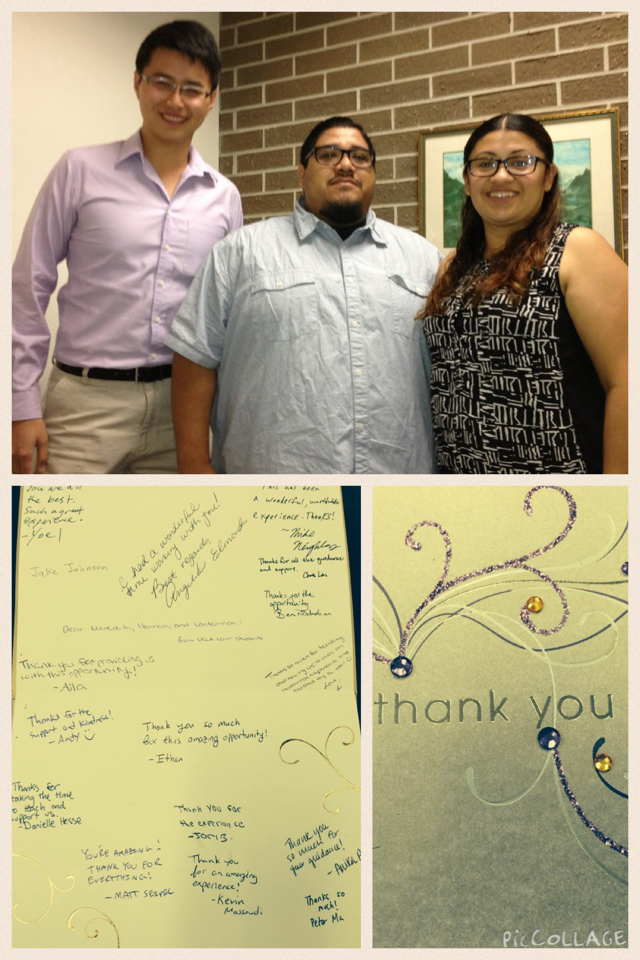
Earlier this year, UCLA School of Law reached out to Meredith Goetz who oversees the Lanterman Special Education Law Clinic, to see if Lanterman would be interested in participating in a month-long trial program that would provide first year law students (LS1s) the opportunity for some time-limited field work. Students would practice interviewing clients and writing summary memos that would be used to help develop the client's case.
The Lanterman Law Clinic approached the 80 or so families they are currently working with and received an outpouring of support for this pilot, so every Friday in the month of October, the first year law students practiced their interview skills with Lanterman families.
“We are grateful to the Law Clinic for all the hard work and care they give to us. Without them, we wouldn’t get the school to listen to us. Thank you. We keep looking forward to working with them," share parents Maria Barrera and Jessi Escalante.
Melinda Sullivan, executive director adds: "This was a win-win, in the process of interviewing Lanterman families, the LS1s were exposed to special education issues and introduced to the field of special education law, gained hands-on practice writing summary memos of the legal issues and assisted the Clinic in their work helping families with the school district."
Whether this model meets the needs of the UCLA School of Law to provide field work to first year students going forward, one thing can be said for certain, it did leave an impression on one first year law student - Ethan Feng. He says, “It was wonderful to see how your organization can help children and young adults with special needs.”
If you would like more information about the Lanterman Special Education Law Clinic, contact your service coordinator.
Pictured from left to right: Law student Ethan Feng and parents Jessi Escalante and Maria Barrera and Below: A thank you card from UCLA Law School students that participated in the pilot program interviewing parents about their special education concerns.
New Rules for IHSS Regarding Overtime and Related Changes Coming in the New Year
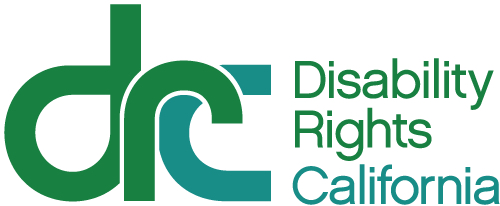
On January, 1, 2015, new federal rules and state laws take effect regarding overtime and related changes. Check out this informative publication from Disability Rights California called "New Rules for IHSS: Overtime and Related Changes" for everything you need to know.
Learn More About the Lanterman Coalition’s Ten4Ten Campaign

Check out the Lanterman Coalition's Ten4Ten campaign that suggests ten things clients, families, service providers and others can do to advocate for a 10% increase to stop the current collapse of the community based service system for children and adults with developmental disabilities.
Area Board 10 Gets a New Name in the New Year

A new year brings a new name for Area Board 10... Assembly Bill 1595 goes into effect January 1, 2015 and it contains some changes to the structure of the Area Boards. For the past 12 years, Area Boards have been constituted as regional offices of the California State Council on Developmental Disabilities (SCDD). With the passage of AB 1595, the term “Area Board” will be eliminated to better clarify that the offices are regional offices of the State Council. This will bring the California Council into alignment with the federal law that governs their operations. They intend to continue transmitting the same informative monthly newsletter with a new byline. And, their office remains committed to serving the needs of the Los Angeles developmental disability community. See more online at www.scdd.ca.gov/areaboards.htm.
DDS SafetyNet ~ Be Smart: Manage Your Money

Having your own money means you can choose how to spend it. Sometimes, we spend more than we mean to. Learn how to make smarter spending choices. Below are a few easy tips for managing your money. Share them with your supporter, or someone you support.
- Make a Budget
- Consider: Needs vs. Want
- Think, Plan, Do
- A Tip for the Holidays: Save money and give homemade gifts
For more useful tips on managing your money, read the DDS SafetyNet e-mail at or visit the DDS SafetyNet Web site at www.ddssafety.net.
Hearing Held to Determine Impact from Funding Reductions, First Steps Towards Sustainability

Hearing Held to Determine Extent of Impact from Funding Reductions on Community Services for People with Developmental Disabilities, and First Steps Towards a Sustainable Future for the System
It’s been said in the past that the regional centers are at the hub of the community service system, they connect all of the various spokes together in a central place by coordinating the services and supports that children and adults with developmental disabilities rely on to be active, productive and contributing members in their communities. The spokes, if you will, are made up of the service providers, families and other community organizations that provide the services and supports directly to regional center clients. Together they formed a well-honed wheel. For many years this system worked reasonably well despite the challenges of chronic underfunding.
However, with the many budget cuts, rate freezes and restrictions placed on regional centers and service providers during the “Great Recession” some of the spokes began to fail. When one spoke breaks, the rest of them bear up for a while under the added stress/pressure, but eventually another one breaks, and then another one, until a critical point has been reached, where the other ones can no longer compensate and hold the wheel together. This is the case with the community service system today. Both providers and regional centers have been significantly degraded. The quality of services has suffered by the inability to hire and keep qualified staff; the inability to maintain, repair and invest in facilities and equipment; and that a number of providers reluctantly made the difficult decision to close their doors. Today, the system that is relied upon by over 270,000 children and adults with developmental disabilities and their families is at a critical point of breaking down.
Earlier this year, the California Legislature named 2014 as the “Year of the Community” and the beginning of a decade of renewed commitment to both the vision of the Lanterman Act and the investments needed to ensure a sustainable future for California’s community service system. Read the resolution
On October 9, 2014, an informational hearing in Los Angeles, was a first step in charting the way forward for the regional center service system as a whole. The California Senate Human Services Committee, chaired by Senator Jim Beall heard testimony from parents, providers, regional centers and advocates on the state of the community service system.
Following is a summary from Lanterman Executive Director Melinda Sullivan of the testimony shared at the hearing: “The hearing was pretty passionate. There were nonprofit organizations that reported the inability to fundraise enough to close the gap and making decisions to close day services or residential homes. Families talked about the turnover, due to providers’ inability to pay well enough to retain staff. There was a consistent theme that service providers have been hurt by the last several years of cuts and freezes, which in turn has impacted clients and families. One parent commented that while there may not be formal waiting lists for services, the fact that providers do not have adequate staff inadvertently causes a waiting list because they need to hire staff before they can accept a new referral. The Lanterman Coalition, which includes ARCA, (the Association of Regional Center Agencies) is advocating for an immediate 10 percent increase and a 5 percent annual increase for providers and regional centers while the Department Of Developmental Services and special taskforces work to develop long-term strategies.” Read ARCA’s complete written testimony
Change is coming to the regional center system regardless, by way of changes at the federal level. Federal funding accounts for 40 percent of the financial support for the community based system of services and supports. (read more in the CDCAN report) However, we can influence the changes and decisions at the state level, and we all have an obligation to be part of the solution. Work is far from complete, and an important lesson learned from the past, is that we cannot leave the fate of our system in other people’s hands. Our representatives need to hear from us, we need to go talk to our state senators and assemblymembers in the districts that we live.
The impetus is there in the Legislature, but they need to hear and see that we’re serious about restoring our programs and services starting with an emergency 10 percent across-the-board increase in provider rates and regional center operating funds to stabilize the system and stop the crumbling. The ARC and UCP California Collaboration sent out an e-mail with a number of helpful tips that each of us can carry out to do our part to help restore services for people with developmental disabilities. Read more in their action alert about what steps you can individually take
October ~ PACER’s National Bullying Prevention Month

The End of Bullying Begins with Me is the message to remember during PACER’s National Bullying Prevention Month in October. It’s a time when communities unite nationwide to raise awareness of bullying prevention through events, activities, outreach, and education. PACER created the campaign in 2006 with a one-week event which has now evolved into a month-long effort to encourage everyone to take an active role in the bullying prevention movement. PACER offers a variety of resources to use year-round, but especially during October, to inspire, educate, and inform. Check out the many events and activities, and make plans to join the movement and take action where you live.
Files
Why Vote? - Members of the ARCA CAC Share What Voting Means to Them, Register to Vote by Oct. 20
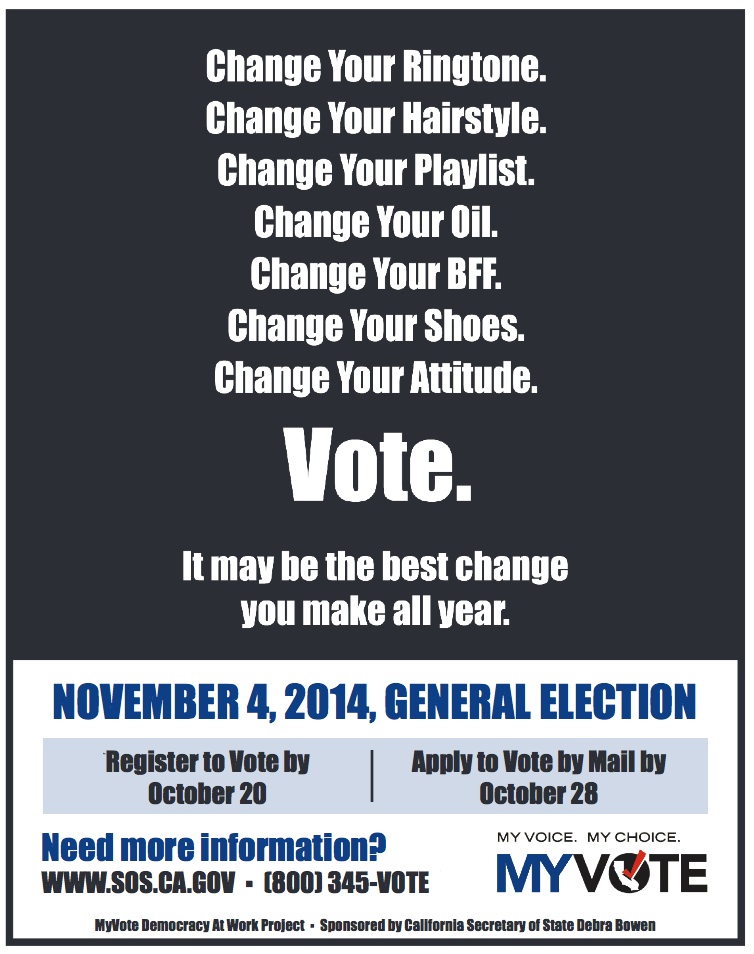
The California Foundation for Independent Living Centers through its Disability Organizing Network is hosting a video contest. Groups and individuals were encouraged to submit brief (30 second to 2 minute) videos encouraging individuals with disabilities to vote. The ARCA CAC members decided at their recent meeting that they wanted to participate in the contest and that given the limited allowed length of the video that they each wanted to share why voting is important to them personally. Their video features 13 members of the ARCA CAC expressing in their own words why voting matters to them. The one minute video can be seen here
The deadline to register to vote in the upcoming November elections is October 20, 2014. All necessary information about registering to vote and voting in California is available in the Elections section on the California Secretary of State's Web site.
Files
A Message from Lanterman’s New Executive Director Melinda Sullivan
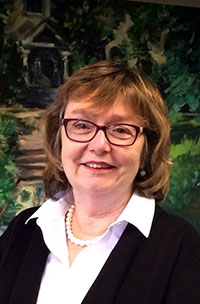
I’m honored to have been selected by the board of directors as Lanterman Regional Center’s next executive director. I’ve worked closely with Diane Anand for nearly two decades and am looking forward to this opportunity to continue to nurture the strong Lanterman culture and core values that were fostered under her leadership and guidance.
I look forward to continuing to build on and developing the collaborative working relationship that exists between our clients, families, service providers and staff in this new capacity. We at the Center are working together to achieve a seamless transition. I will be reaching out to many of the Center’s partners. I plan on visiting families through support groups, as well as outreach to the service provider community. Communication is the cornerstone of collaboration, and these in-person meetings will play an important role in setting the priorities for this next year.
I’d like to take this opportunity to acknowledge the staff at Lanterman. The Center has a highly competent and talented executive and leadership team that embodies the Lanterman values and service commitment. Our direct and support staff are truly the forward face of this organization and it is their hard work and dedication to Lanterman clients and families that enables us as an organization and community to work towards achieving our vision of “a world where every person is respected and embraced.”
A Letter from Larry DeBoer, President and Chairman of the Board of Lanterman Regional Center
Many of you may have heard that after nearly four decades as Lanterman Regional Center’s executive director, Diane Anand is retiring this June. During this time she led the Center through periods of significant growth and also safely guided the Center through periods of recession, including significant fiscal and legislative challenges. I hope you will join me in expressing our gratitude for the singular effort Diane has brought to not only our regional center, but the service system as a whole.
The highest priority for Lanterman’s board of directors has been to ensure that the Center is well situated and prepared for a smooth transition of leadership. The board has been engaged in succession planning for well over a year, reviewing all aspects of how Lanterman operates and conducts business, and for the past six months in the selection of the Center’s next executive director.
With that said, it gives me great pleasure to share with you that the board has selected Melinda Sullivan as the Center’s new executive director. Melinda has been at Lanterman for 27 years working in a number of capacities, including as a regional manager, director of Community Services and most recently as associate director of Client and Family Services, a position she has served in for the past 17 years. Melinda truly exemplifies the Lanterman core values, and has the skills, knowledge, character and experience that the board was looking for in the Center’s next leader. Widely known and respected within the developmental services system, we believe that Melinda is the right choice to lead the Center now and into the future.
The board of directors looks forward to working with Melinda during this transition as we all continue to work towards our mission of creating a community where people with developmental disabilities live purposeful lives as active members of their communities.
DDS SafetyNet ~ Summer Splash: Water Safety E-newsletter

During hot summer months, playing in the water is a great way to cool off. You might go to the beach, or take a dip in the pool. However, the water can be dangerous.
Read the DDS SafetyNet ~ Summer Splash: Water Safety e-newsletter to learn how to stay safe in the water.
Disability Political Action Voice (DPAV) Established: Seeking Support from Stakeholders
The co-author of the Lanterman Act and other leaders in developmental services in California - Arthur Bolton, Norman Green, Denny Amundson, Shirley Dove, Bruce Mackenzie, Julie Jackson, and Elaine Lewis - have been named as the steering committee of a new Disability Political Action Voice.
Their message: Our goal is simple and we will, through polictial action, seek to maintain the Lanterman Act and reduce the severe budget cuts to California's developmentally disabled people. With your votes and contributions we can and will make an impact on the funding losses that are diminishing the very best developmental disabilities system in the United States.
What is DPAV and Why Do We Need It?
DPAV stands for disabiltiies political action voice. It is the missing piece in our developmental system, the political piece. The evidence of the need is very clear. During the last few years, the state, under economic pressure, has slashed our services by hundreds of millions of dollars. The governor proposed cutting even more: 3/4 of a billion dollars! And the end is not in sight. More cuts loom on the horizon. We are all very aware of the impact. Caseloads are too high, wages are too low and workers are losing their jobs. Those of us with disabilities and our families are the hardest hit as services and choices are diminished. The promise of the Lanterman Act is in danger of compromise and has even been targeted in the past to be removed. California's community system - the best in the nation - is in serious trouble. Our D.D. system employs over 100,000 workers and serves over 250,000 people with disabilities and their families.
We are at the mercy of 120 legislators and a governor. These 121 politicians hold our fate in their hands. We have been an easy target. They may not enjoy hurting us, and they pay no price when they do. This must and will change.
DPAV is designed to change that as the political voice of the developmentally disabled workers and their families - Together we can make a difference!
DPAV will:
-
Endorse candidates for governor and the legislature.
-
Make election campaign contributions.
-
Make expenditures on behalf of candidates.
-
Ask candidates to sign pledges on important issues.
-
Publish and communicate things that favor or oppose candidates.
DPAV will do these things that many other agencies and organizations in the D.D. system are not legally allowed to do. We expect many of the 350,000 (workers and families) to make a small annual contribution to DPAV, in whatever amount they can afford. And why wouldnt they? They have everything to gain. If we do not fight for the funding ourselves, no one will!
DPAV will maintain a close relationship with all the organizations in the D.D. system to guarantee good coordination, open communication and transparency. DPAV will be guided by a steering committee with representation from affected interests.
It is said, "The best time to plant a tree is twenty years ago." We must plant our trees today. Our future depends on it. Please join with the 350,000 and contribute to DPAV now.
For more information, contact:
Arthur Bolton, 916.359.6415, artboltonconsulting@yahoo.com
Norman Green, 916.256.6573, ngreen.dpav@yahoo.com
File
October is National Bullying Prevention Month

"The End of Bullying Begins with Me" is the message during PACER’s National Bullying Prevention Month in October. It’s a time when communities can unite nationwide to raise awareness of bullying prevention through events, activities, outreach and education. PACER created the campaign in 2006 with a one-week event which has now evolved into a month-long effort that encourages everyone to take an active role in the bullying prevention movement.
Resources from PACER’s National Bullying Prevention Center make it easy to take action. Check out the resources online at www.pacer.org/bullying.
Also, be sure to wear orange on Wednesday, October 10, 2012 for Unity Day - "Make it Orange and Make it End." If you care about students who are bullied and want bullying to end, make your color orange on Unity Day. That’s the day everyone can link together - in schools, communities and online - and send one large, orange message of support to students who have experienced bullying. In 2011, Ellen DeGeneres promoted the cause on television by wearing orange and reminding millions of viewers about the importance of bullying prevention. Facebook supports the cause during October by providing users with information on PACER activities on its safety, educator, and privacy pages. Learn more about Unity Day at www.pacer.org/bullying/nbpm/unity-day.asp.
File
California Secretary of State Launches New Online Voter Registration Application Process
Secretary of State Debra Bowen has launched the new California Online Voter Registration (COVR) application process. Anyone who is eligible to register to vote in California can submit an electronic voter registration application by going to www.sos.ca.gov/elections/register-to-vote or www.registertovote.ca.gov.
For more information about how the online voter registration process works refer to the Secretary of State's frequently asked questions (FAQ) document at www.sos.ca.gov/elections/elections_faq.htm for answers to some of the most common questions people ask about applying to register to vote online.
File
Free Braces for Kids in Los Angeles County
Free braces are available for kids in Los Angeles County, including any child without insurance, one who is part of Medi-Cal, Health Families or Healthy Kids, with no proof of immigartion status needed. Free braces is contingent on qualification for services (State Scale Qualified by Clinical Screening). For more information, contact Hawthorne Dental at 310.973.6428.
File
Surviving the Heat: Tips from LA County’s Emergency Survival Program
As the temperature rises and summer heat sets in, it's important that we all take precautions to reduce and prevent heat-related health issues. So, if you plan to be outdoors, please take precautions to protect yourself from the sun and heat. And if you need a place to cool down, check out the list of LA County Cooling Centers. Please note, if you are planning to visit one of the Cooling Centers, it is advisable that you call in advance to make sure there is still seating available. If a Cooling Center is not operational, check the attached list for another Cooling Center nearest you or call “211.” Check with your local library when looking for a place to cool down. They have great resources and plenty to read while you escape the heat.
File
Dr. Barak and His Chicken Herbert are Coming to Read Two Books on August 27

Dr. Barak and his chicken Herbert are coming to the Koch-Young Resource Center library on Monday, August 27, 2012 from 2 p.m. to 4 p.m. to read two books: "The Snail Who Lost His Trail" and "The Octopus Who Tried To Grow A Mustache."
For more information about Dr. Barak and Herbert, visit www.threechickenbooks.com.
Please RSVP with the KYRC at 213.252.5600 or kyrc@lanterman.org. The KYRC library is located on the first floor at Lanterman at 3303 Wilshire Boulevard, Los Angeles.
File
Summertime Social/Recreational Opportunities
Summertime brings with it a break from the routine and regular schedule of the school year, but with the free time also comes the need to find social and recreational opportunities to make the most of that time.
Following is a link to a Summer Fun Packet (in PDF format) which is a compilation of agencies, organization, ideas, activities and more for the summer that was created by Westside Family Resource and Empowerment Center.
There are also links to flyers for various summer activites and opportunities being offered in and around the Lanterman area.
Click on the flyer link to view more information.
Files
TCM to Examine Hollywood’s Depiction of People with Disabilities in October
Turner Classic Movies (TCM) will dedicate the month of October to exploring the ways people with disabilities have been portrayed in film. On behalf of Inclusion in the Arts, Lawrence Carter-Long will join TCM host Robert Osborne for The Projected Image: A History of Disability in Film. The special month-long exploration will air Tuesdays in October, beginning Oct. 2 at 8 p.m. (ET).
TCM makes its announcement to coincide with the 22nd anniversary of the signing of the Americans with Disability Act (ADA) on July 26. And in a first for TCM, all films will be presented with both closed captioning and audio description (via secondary audio) for audience members with auditory and visual disabilities.
"The Projected Image: A History of Disability in Film" features more than 20 films ranging from the 1920s to the 1980s. Each night's collection will explore particular aspects, themes, or types of disability, such as blindness, deafness and psychiatric or intellectual disabilities. In addition, one evening of programming will focus on newly disabled veterans returning home from war.
TCM's exploration of disability in cinema includes many Oscar®-winning and nominated films, such as An Affair to Remember" (1957), in which Deborah Kerr's romantic rendezvous with Cary Grant is nearly derailed by a paralyzing accident; "A Patch of Blue" (1965), with Elizabeth Hartman as a blind white girl who falls in love with a black man, played by Sidney Poitier; "Butterflies Are Free" (1972), starring Edward Albert as a blind man attempting to break free from his over-protective mother; and "Gaby: A True Story" (1987), the powerful tale of a girl with cerebral palsy trying to gain independence as an artist; "Johnny Belinda" (1948), starring Jane Wyman as a "deaf-mute" forced to defy expectations; "The Miracle Worker" (1962), starring Anne Bancroft as Annie Sullivan and Patty Duke as Helen Keller; "One Flew Over the Cuckoo's Nest" (1975), with Jack Nicholson as a patient in a mental institution and Louise Fletcher as the infamous Nurse Ratched; "The Best Years of Our Lives" (1946), the post-War drama starring Fredric March, Myrna Loy and real-life disabled veteran Harold Russell; and "Charly" (1968), with Cliff Robertson as an intellectually disabled man who questions the limits of science after being turned into a genius.
"The Projected Image: A History of Disability in Film" also features several lesser-known classics ripe for rediscovery, including the atmospheric Val Lewton chiller "Bedlam" (1946), the intriguing blind-detective mystery "Eyes in the Night" (1942); "A Child is Waiting" (1963), with Burt Lancaster and Judy Garland; the British family drama "Mandy" (1953); and a bravura performance by wheelchair user Susan Peters in "Sign of the Ram" (1948). A complete schedule is included at the end.
Each year since 2006, TCM has dedicated one month toward examining how different cultural and ethnic groups have been portrayed in the movies. Several of the programming events have centered on Race and Hollywood, with explorations on how the movies have portrayed African-Americans in 2005, Asians in 2008, Latinos in 2009, Native Americans in 2010 and Arabs in 2011. TCM looked at Hollywood's depiction of gay and lesbian characters, issues and themes in 2007.
"'The Projected Image: A History of Disability in Film' is a valuable opportunity to take a deeper look at the movies we all know and love, to see them from a different perspective and to learn what they have to say about us as a society," said Osborne. "We are very proud to be working with Inclusion in the Arts on this important exploration. And we are especially glad to have Lawrence Carter-Long of the National Council on Disability with us to provide fascinating, historical background and thought-provoking insight on how cinematic portrayals of disability have evolved over time."
"From returning veterans learning to renegotiate both the assumptions and environments once taken for granted to the rise of independent living, Hollywood depictions of disability have alternately echoed and influenced life outside the movie theater," said Carter-Long, who curated the series. "Twenty-two years after the passage of the ADA and over a century since Thomas Edison filmed 'The Fake Beggar,' TCM and Inclusion in the Arts provide an unprecedented overview of how cinematic projections of isolation and inspiration have played out on the silver screen - and in our lives. When screened together, everything from 'The Miracle Worker' to 'One Flew Over the Cuckoo's Nest' reveals another layer where what you think you know is only the beginning."
About Lawrence Carter-Long
Widely recognized for his expertise in the arts, access and media, Lawrence Carter-Long is a sought-after media spokesperson on a wide variety of subjects, ranging from medical ethics to media representation of disability. His numerous media appearances have included The New York Times, NBC's Today Show, CNN, NPR and the BBC, among others. He was a co-host and producer on The Largest Minority Radio Show on WBAI-FM from 2006-2011.
While recognized for his media work, Carter-Long is perhaps best known as the founder and curator of the disTHIS! Film Series, presented in partnership with New York University's Center for the Study of Disability from 2006 until 2010. The groundbreaking monthly film series brought new audiences and attention to cinematic representation of disability by showcasing edgy, provocative and unconventional portrayals across the disability spectrum with the promise of "No handkerchief necessary; no heroism required." He was a member of the steering committee of the ReelAbilities: Disabilities Film Festival from 2007-2010 and selected the Emerging Disabled Filmmaker Apprenticeships for the American Film Institute/Silverdocs and VSA Arts from 2009-2011.
For his advocacy, Carter-Long was awarded the Frieda Zames Advocacy Award by New York City Mayor Michael Bloomberg in 2009 and the Paul G. Hearne Leadership Award from the American Association of People with Disabilities in 2010. In May 2011, Carter-Long moved to Washington, D.C. to work as the public affairs specialist for the National Council on Disability, an independent federal agency that recommends federal disability policy to the President, Congress and other federal agencies.
Connect with Lawrence Carter-Long
Facebook: http://www.facebook.com/LawrenceCarterLong
Twitter: http://twitter.com/LCarterLong
National Council on Disability: http://www.ncd.gov
About Inclusion in the Arts
Inclusion in the Arts advocates for full inclusion of artists of color and performers with disabilities at all levels of production in film, television, and theatre. Our principal aim is to achieve full inclusion in American arts and entertainment, such that what we see on our screens and stages truly reflects the society in which we live; where each artist is considered on his/her merits as an individual; where the stories being told are drawn from authentic and diverse experiences; and where our individual humanity can be celebrated.
Connect with Inclusion in the Arts
Website: http://inclusioninthearts.org
Facebook: http://www.facebook.com/InclusionInTheArts
About Turner Classic Movies (TCM)
Turner Classic Movies is a Peabody Award-winning network that presents great films, uncut and commercial-free, from the largest film libraries in the world. Currently seen in more than 85 million homes, TCM features the insights of veteran primetime host Robert Osborne and weekend daytime host Ben Mankiewicz, plus interviews with a wide range of special guests. As the foremost authority in classic films, TCM offers critically acclaimed original documentaries and specials, along with regular programming events that include The Essentials, 31 Days of Oscar® and Summer Under the Stars. TCM also stages special events and screenings, such as the TCM Classic Film Festival in Hollywood; produces a wide range of media about classic film, including books and DVDs; and hosts a wealth of materials at its Web site, http://tcm.com, TCM is part of Turner Broadcasting System, Inc., a Time Warner company.
Turner Broadcasting System, Inc., a Time Warner company, creates and programs branded news, entertainment, animation and young adult media environments on television and other platforms for consumers around the world.
Connect with TCM
Website: http://www.tcm.com
Pressroom: http://news.turner.com/tcm
Facebook: http://www.facebook.com/tcmtv
Twitter: http://www.twitter.com/tcm | http://www.twitter.com/tcmpr
"The Projected Image: The History of Disability in Film" Schedule
The following is a complete schedule of TCM's The Projected Image: The History of Disability in Film, airing Tuesdays in October. All times Eastern. Schedule subject to change:
Tuesday, October 2
8 p.m. - An Affair to Remember (1957)
10:15 p.m. - A Patch of Blue (1965)
12:15 p.m. - Butterflies are Free (1972)
2:15 a.m. - Gaby: A True Story (1987)
4:15 a.m. - Sign of the Ram (1948)
Tuesday, October 9
8 p.m. - Lucky Star (1929)
9:45 p.m. - Bright Victory (1951)
11:45 p.m. - Reach for the Sky (1956)
2:15 a.m. - The Best Years of Our Lives (1946)
Tuesday, October 16
8 p.m. - Eyes in the Night (1942)
9:30 p.m. - 23 Paces to Baker Street (1956)
11:30 p.m. - Johnny Belinda (1948)
1:30 a.m. - The Miracle Worker (1962)
Tuesday, October 23
8 p.m. - A Child is Waiting (1963)
10 p.m. - Mandy (1953)
Midnight - Of Mice and Men (1939)
2 a.m. - Charly (1968)
Tuesday, October 30
8 p.m. - The Unknown (1927)
9:15 p.m. - Freaks (1932)
10:30 p.m. - Bedlam (1946)
Midnight - One Flew Over the Cuckoo's Nest (1975)
Magnolia Place Introduces CSU Farm Stand Program at Their Site
Every Thursday from 9:30 a.m. to 12:30 p.m. at Magnolia Place, you can get a bag of healthy, local, organic fruits and veggies for $10 to $24, depending on the size.
All produce is seasonal and bags currently contain citrus, tomatoes, zucchini, collards, kale, carrots, apples and more.
You must sign up to participate in the Farm Stand program. Sign ups can be done online at http://csuinc.org/shop/.
Secretary Bowen Launches Survey to Assess Needs of Voters with Disabilities
As Californians prepare to vote in the June 5 Presidential Primary Election, California Secretary of State Debra Bowen launched the state’s first online survey to help elections officials assess and address the needs of voters with disabilities.
“Voting is our most sacred right in a democracy and everyone should be able to exercise that right independently and privately,” said Secretary Bowen, the state’s chief elections officer. “While California elections officials offer many resources to voters with disabilities, I want to know if these voters are aware of all the options and services available to them, as well as whether they are encountering unnecessary challenges when voting.”
The Secretary of State’s office established the eight-member Statewide Voting Accessibility Advisory Committee (VAAC) in 2005 to provide guidance to elections officials serving voters with disabilities. Since then, the Secretary of State’s office updated 10-year-old polling place accessibility guidelines and provided training to county elections staff on the federal and state requirements for accessible polling places, all in collaboration with the VAAC and the California Department of Rehabilitation. Now the Secretary of State is asking voters with disabilities to participate in a brief confidential survey available at www.surveymonkey.com/s/P8MW27Q through June 29. Survey results will help identify whether there is a need for more training, modified services, or enhanced outreach programs for voters with disabilities.
Following are key resources that are available to California voters with disabilities.
Large-Print and Audio Formats: Official ballots and the Secretary of State’s Voter Information Guide are available in alternate formats for voters with visual disabilities. For more information about large-print or audio formats of ballots in a specific precinct, voters should contact their county elections offices or, at the polling place on Election Day, ask a poll worker for more information about using a special voting machine. To download the MP3 audio version or the large-print version of the Secretary of State’s Voter Information Guide, go to http://voterguide.sos.ca.gov/alt-versions/. The Secretary of State also takes phone orders for state voter guides, which are available in 10 languages (see below for phone numbers).
Polling Place Accessibility: State and federal laws require polling places to be physically accessible to voters with disabilities, and every person who works in a polling place on Election Day is there to ensure voters’ rights are protected. In California, each polling place has at least one voting machine that allows voters, including those with disabilities, to cast a ballot without assistance. California law also permits up to two people of a voter’s choice, excluding the voter’s employer or union representative, to assist in marking the ballot. If a voter cannot come into the polling place, “curbside voting” is an option in which a poll worker carries a ballot outside the polling place to the voter.
Voting by Mail: Any California voter may vote in the comfort of home by asking to vote by mail. The last day to request a vote-by-mail ballot for the state primary election is May 29. A registered voter may request a ballot by using the application printed on the back of the sample ballot booklet (mailed to the voter by the county elections office) or the uniform application available at www.sos.ca.gov/elections/vote-by-mail/pdf/fill-in-vote-by-mail-app-instruct.pdf.
Voter Hotlines: The Secretary of State offers phone assistance to voters in 10 languages and Telecommunications Device for the Deaf (TDD):
English (800) 345-VOTE (8683)
Spanish (800) 232-VOTA (8682)
Chinese (800) 339-2857
Hindi (800) 345-2692
Japanese (800) 339-2865
Khmer (888) 345-4917
Korean (866) 575-1558
Tagalog (800) 339-2957
Thai (855) 345-3933
Vietnamese (800) 339-8163
TDD (800) 833-8683
For more information on how voters with disabilities can vote privately and independently, go to www.sos.ca.gov/elections/elections_dis.htm.
Keep up with the latest California election news and trivia by following @CASOSvote on Twitter. To subscribe to state election news via e-mail, RSS feed or Twitter, go to www.sos.ca.gov/multimedia.
To view this and other Secretary of State press releases, go to www.sos.ca.gov/admin/news-releases.htm.
Cerebral Palsy Scholarship Foundation Announces Scholarship Opportunities
The mission of the nonprofit Cerebral Palsy Scholarship Foundation is to encourage and assist students with cerebral palsy to pursue college, university or vocational school education. For the 2012/2013 academic year, Cerebral Palsy Scholarship Foundation is offering two categories of scholarships: 1. for credit course work scholarship for full or part-time students - awards up to $2,500 or 2. scholarship for audit/non-credit course work - award up to $500; payment for one class.
Award money may be applied to tuition, textbooks, lab supplies and/or an in class assistant for note taking, communication, navigation or health needs. This program is open to California residents, age 17 or older, with a diagnosis of cerebral palsy who will be attending an accredited undergraduate U.S. college, university or vocational school Fall 2012/Winter 2013. Scholarships will be awarded based on a combination of financial need, past academic performance, passion (as detailed by a 150 word or less essay) and other criteria such as personal challenges. Applications are available at their Web site, www.cerebralpalsyscholarship.org. Completed applications are due by May 15, 2012.
File
ATTENTION SERVICE PROVIDERS - SCAM ALERT

Several residential providers have received a phone call from someone claiming to be with Homeland Security/ Immigration. This is a scam and you should and not provide the caller with any information.
The phone number the caller uses has a strange area code and may have a 63 prefix.
The caller asks for the owner by name, then asks how many employees the provider has. The caller says the owner must complete a form that will be e-mailed to them. The caller says there is a $100 per person fee to process the form and requests a credit card number. The caller says this form must be completed immediately or there is a $10,000 per employee penalty.
Again, this is a scam. Do not provide staff names or credit card information to the caller.
LA County Announces Activation of 211 LA County Disaster Hotline for Residents to Report Wind Damage
The Los Angeles County Chief Executive Office, Office of Emergency Management (OEM) announced the activation of the 211 LA County Disaster Hotline on December 5 (1.800.980.4990) for residents to report damages caused by the recent wind storm event.
As the recovery efforts continue in the Los Angeles County Operational Area (OA), OEM continues to collect Initial Damage Estimates from County departments, cities and unincorporated areas to determine public and private sector damages throughout the County. OEM will continue to coordinate with the California Emergency Management Agency to secure State and Federal assistance as warranted.
On Dec. 1, Los Angeles County Mayor Michael D. Antonovich declared a state of emergency for the cities and unincorporated areas in the County.
OEM stands ready to ramp up if conditions warrant. In addition, all County departments continue to prepare and be ready to respond to any future emergencies and/or disasters.
Governor Seeks Ballot Initiative for $7 Billion in Temporary Tax Increase for November 2012 Ballot
Proposes Five Year Temporary Income Tax Increase on Wealthy Californians and 1/2 Cent Temporary Increase In State Sales Tax - Funding Would Be Dedicated for Education and Public Safety
Governor Brown will seek to place on the November 2012 general election ballot an initiative that proposes to raise $7 billion through a combination of temporary tax increases on the wealthy and a temporary increase of the state sales tax, targeting the increased revenues specifically for education and public safety and "not to other programs we cannot afford." The Governor did not specify what those other programs were that the State cannot afford.
File
Professional Development Opportunity for Poets in Southern California
VerseAbility is an effort to create a writers group for aspiring poets who share the experience of disability and who live in Southern California. With a professional development focus, poets meet once a month (in person and/or online) to share experiences, read work, offer criticism and provide peer support. VerseAbility will be facilitated by a professional writer/poet. VerseAbility is a poetry group NOT therapy. VerseAbility is looking for up to a dozen aspiring poets. If you are interested participating or would like more information, contact Martin Sweeney at mlsla@sbcglobal.net or call 626.796.1402.
Optional Adult Dental Services for DDS Regional Center Clients Restored
Effective January 13, 2012, the Medi-Cal Dental Program (Denti-Cal) will begin processing dental claims for regional center clients (also known as DDS beneficiaries or clients of DDS) age 21 and over, who have Medi-Cal and do not reside in a licensed health facility (Intermediate Care Facility or Skilled Nursing Facility). Services may be provided effective January 1, 2012; however providers should not submit claims for regional center clients to
Denti-Cal until January 13, 2012.
File
Join HaMercaz and Chaverim on Sunday, January 29, 2012 at Disneyland
Join HaMercaz and Chaverim on Sunday, January 29, 2012 at Disneyland. Tickets are offered at a discounted rate of $40 per person. All tickets for children over 3 and adults are $40 (Regular admission to Disneyland is $80 per person). Limit 6 tickets per family. Come on your own and meet HaMercaz in Tommorowland for lunch. Details will follow. A limited number of tickets are available and must be purchased by December 6, 2011. Pre-payment is required. Tickets will be mailed following purchase. For more information and to purchase tickets, contact Sarah at HaMercaz at 866.287.8030 or e-mail hamercaz@jfsla.org. These tickets are made available through Disney's Community Involvement Day and scholarships are not available for this.
Cold and Flu Season is Upon Us: Check out Lanterman’s Fast Facts for More Info About Colds and Flu
Many of us have already had our first cold of the season, or know someone who has, and that means the flu is lurking out there too. Check out Lanterman's fast facts sheet about colds and the flu for more information about signs and symptoms, what to consider to prevent getting sick and what to do if you or someone you're caring for is sick, and for links to even more information about colds and the flu.
File
New Medicaid Resource Available from The Arc
The Arc is excited to announce a valuable new resource available at www.thearc.org to help guide people with intellectual and developmental disabilities and their families through the complexities of Medicaid benefits, services and supports. The Medicaid Reference Desk offers detailed, state-by-state information about Medicaid benefits, a glossary of terms, answers to frequently asked questions, person-centered planning resources and a blog from The Arc’s training specialist about issues related to Medicaid, self-advocacy and person-centered planning.
Medicaid is the largest source of financing for disabilities services in the United States. For people with disabilities and for those who provide their care, Medicaid serves as a valuable safety net. Often the only source of financial assistance for health care, Medicaid plays a critical role for people with disabilities in providing coverage and access to care. Medicaid is, however, extremely complicated. At least half of the funds for Medicaid programs come from the Federal government with the remainder coming from state funds. Federal law contains detailed requirements and limitations on eligibility, services, and financing. But, state law varies widely.
This project was made possible by a grant from the U.S. Department of Health and Human Services, Administration on Developmental Disabilities (Grant No. 90 DN0215). Explore the Medicaid Reference Desk via the Resources section of www.thearc.org or www.thedesk.info.
Richard Koch, M.D. – 1921-2011 – A Man Who Made Things Possible
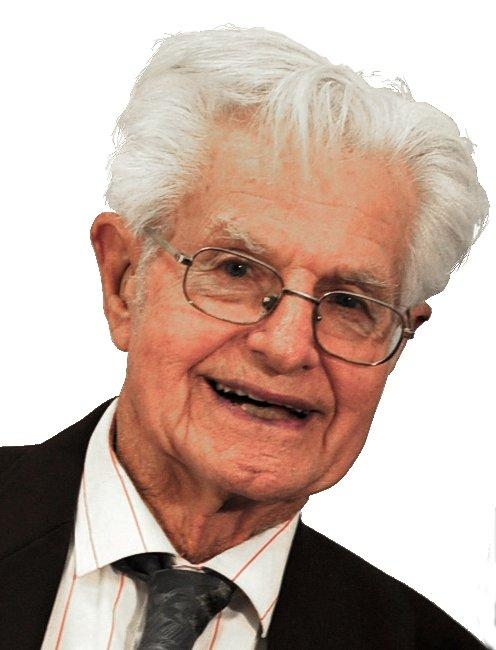
Dick Koch was truly an original. His charm, dedication and humor engaged anyone who worked with him. His deep commitment to his patients made them feel more like family members than clients – and his vision and determination changed society.
Described as a man of “passionate empathy,” Dick Koch exemplified the art of the possible. He lived in a world of “Why not? Let’s try” – and that made all the difference in the lives of literally thousands of people.
Most individuals are fortunate if they have even one area of endeavor where they make a mark. Dick had several – as renowned pediatrician and PKU researcher, as a pioneer in the field of improved services for individuals with developmental disabilities, as teacher and as social justice activist.
Richard Koch was born in Dickinson, North Dakota in 1921, the sixth child in a family that eventually included seven boys and two girls. The family moved to Petaluma, California when he was a child and he attended elementary and high school there, graduating in 1941 and earning a scholarship at the University of California at Berkeley.
In 1942 he enlisted in the Army Air Corps and was trained as a bombardier. He served in the 8th Air Force based in England until his B-24 was shot down on April 9, 1944. He spent 13 months as a prisoner of war at Stalag Luft 1 in Germany.
After the war, he was accepted at the University of Rochester School of Medicine in New York, graduating in 1951. He interned at Childrens Hospital Los Angeles where he eventually joined the staff and became a Professor of Pediatrics at the Keck School of Medicine at the University of Southern California.
Dr. Koch was an early advocate in the fight to keep people with developmental disabilities out of institutions, provide support for families to care for children at home, and ensure community living options for adults. In 1957 he started a traveling clinic that brought a team of professionals to 13 Southern California counties to serve children with developmental disabilities. It was groundbreaking work that would lead to a system of service delivery and care for those with disabilities that would become a model for the nation. In 1966 Governor Pat Brown signed legislation that used this model to create the regional center system in California. Eventually 21 regional centers were established throughout the State. Dr. Koch became the first director of Childrens Hospital Regional Center – one of two pilot centers – which would later be renamed Frank D. Lanterman Regional Center.
For a number of years, Dr. Koch also provided medical consultation to the Los Angeles County Jail in assessing individuals who were suspected of having a developmental disability.
In the early 60s, he was President of the California Council for Retarded Children (which became the Association for Retarded Citizens, California) and of the American Association on Mental Retardation, now called the American Association of Intellectual and Developmental Disabilities.
In 1970 he took a sabbatical leave and he and his family spent a year in Peru where he was a volunteer for Project Hope.
He left Lanterman in 1975 to serve as Deputy Director of the State Department of Health.
Over a span of more than 50 years, Dr. Koch conducted extensive research on Down syndrome, PKU (Phenylketonuria which causes mental retardation), and rare metabolic disorders. He was the principal investigator in the Collaborative Study of Treatment of Children with Phenylketonuria sponsored by the National Institutes of Health and principal investigator of the International Maternal Phenylketonuria Collaborative Study. In 1962 he was actively involved in getting legislation passed mandating newborn screening for all babies born in California. Since 1966 when the legislation passed, hundreds of babies have been diagnosed at birth and treated for severe genetic disorders. Dr. Koch was also involved in research to establish guidelines for getting FDA approval for biopterin for the treatment of PKU in the United States. This product is now available under the trade name Kuvan and is the newest treatment for many with PKU. He also pioneered in the treatment of persons with PKU who are disabled because they were born before newborn screening. In 2004, a new group home specifically for late-treated persons with PKU was named in his honor – The Koch-Vagthol’s Metabolic Residential Care Center in Burbank, California.
Dr. Koch has had more than 200 articles published in peer-reviewed professional journals.
He married Jean Holt in 1943 and they raised five children. The family spent many summer vacations back-packing in the Sierra, including a 110-mile round trip hike from Mineral King to Mt. Whitney and a 150-mile hike on the John Muir Trail. He and Jean were active in efforts to save Mineral King from commercialization in the 1970s. This battle was won and Mineral King is now part of Sequoia National Park.
Throughout his life, Dick Koch was a pioneer – beginning with the traveling clinics and continuing through years of advocacy for the regional centers – forging a path to a more fulfilling life for individuals with developmental disabilities.
He touched and changed for the better the lives of hundreds of babies born with PKU, turning a life of potential mental retardation into a future of infinite possibilities.
With his gentle wisdom and firm leadership he mentored many doctors, nurses, social workers and administrators into a lifelong career working in regional centers and special education programs.
His commitment to the environment and social justice helped make California a better place.
Even late in life, his energy defied description.In “retirement” he continued to bicycle to work seeing patients, visiting jails, consulting with regional centers, speaking at international symposia – and fishing, skiing, backpacking and gardening.
Dr. Koch is survived by his wife, Jean, his daughters, Jill Koch Tovey, Christine Koch Wakeem and Leslie Koch, and by his sons, Tom and Martin. He also leaves 10 grandchildren and 9 great-grandchildren.
He passed away peacefully in his home on Saturday, September 24, 2011. He lived a full, adventurous life and accomplished much. A memorial service and reception will be held at All Saints Church in Pasadena on Saturday, October 8 at 4:30 p.m. For more information about the memorial, contact the Koch-Young Resource Center at 213.252.5600 or kyrc@lanterman.org. The favor of a reply is requested if you plan to attend the memorial service.
Donations in his memory can be made to Mount Hollywood Congregational Church, 4607 Prospect Ave., Los Angeles, CA 90027 or to the Guthrie-Koch Scholarship Fund at 6869 Woodlawn Ave. NE #116, Seattle, WA 98115-5469.
File
Community Special Program Partners Starts New Session October 8
CSPP in partnership with Ed Reyes, 1st District Councilman, Lincoln Heights Tutorial Program and Lanterman Regional Center is starting a new program session on October 8. The program's mission is to provide a program which will enhance socialization opportunities and increase self-esteem of students with developmental disabilities (program cannot accomodate individuals with severa behavorial and/or medical problems) in a positive, and learning environment so that they will eventually be mainstreamed into regular programs in the community. Classes include music, arts and crafts, computer, taekwondo, sing aong and other activities. The fee is $100 per session and the classes are hedl on Saturdays from 1:30 p.m. to 5 p.m. at Grace Hall at Young-Nak Presbyterian Church, 150 N. Avenue 18 (Crossing street is Pasadena Ave), Los Angeles, CA 90031. For more information contact Peter Choh at 310.710.0757 or pychoh@yahoo.com.
File
Participate in the Collaborative Family Study
The Collaborative Family Study (CFS) is a joint-project between researchers at the University of California, Los Angeles (UCLA), and the University of California, Riverside (UCR). The CFS is supported by the National Institute of Child Health and Human Development. They are studying adolescents with mild intellectual disability as well as those with typical development. The CFS has already enrolled 180 families who have participated from child ages 3 through 12 years. They are now focusing on the development of youth from ages 12 through 15 years, and are currently enrolling additional families of youths at age 12. The study assesses developmental issues of early adolescence for youths and their families. The Principal Investigators are established researchers with extensive prior work involving children and their families.
Files
Halloween Events for Children, Teens and Families with Special Needs

Pasadena Child Development Associates Halloween Socials
Monday, October 24, Wednesday, October 26 and Friday October 28 from 3:30 p.m. to 5 p.m.
PCDA clients between the ages of 3-12 years old are invited, children under 4 must be accompanied by a parent or guardian
For more information contact PCDA at 626.793.7350 or pcda@pasadenachilddevelopment.org.
KiDA's 3rd Annual Spook-tacular Halloween Carnival
Friday, October 28, 2011 from 4 p.m. to 6 p.m.
Join KiDA for an afternoon of ghoulish games, spoky snacks, face painting, balloon art and trick-or-treating.
Space is very limited, RSVP today at 949.222.2214 or kcoates@kida.com.
The Help Group's Club LA Teen Halloween
Sunday, October 30, 2011 from 4 p.m. to 7 p.m.
13164 Burbank Blvd., Sherman Oaks, CA 91401
Join Club LA Teen for an afternoon of fun at the club's first ever social event for teens ages 13 to 17. Admission to this first event is free and the event will feature a costume contenst, music, interactive video games, raffles, games and prizes, food and karaoke.
RSVP and registration required. RSVP by October 26 to nwebb@thehelpgroup.org or 818.779.5188.
Community Connections: A Back to School Event by SNN
The Special Needs Network is hosting a Back-to-School Event for families and kids with special needs and their peers on August 28, 2011 at the Junior Blind of America. The event consists of a resource fair, medical sreenings, health seminars, food, games, pony rides, free gadgets and school supplies. Contact Special Needs Network for more information. Contact information is available at www.specialneedsnetwork.net/contactus.html.
Recommend an Artist for the Wynn Newhouse Awards
If you know an artist of exceptional merit with a disability and would like to submit his/her name for consideration for the Wynn Newhouse Award, please fill out and submit the online application at http://wnewhouseawards.com/Pages/Recommendations.html.
To be eligible for nomination, a candidate must be a US resident and a fine artist of professional standing with a disability as recognized by the Americans with Disabilities Act. All candidates must have a dedicated website displaying examples of their works. If the artist is selected for consideration, he or she will be contacted directly to submit a complete application package. The recommendations deadline is October 1, 2011. For more information visit http://wnewhouseawards.com/.
I Am, I Can, I Do PSA Seeking Individuals with Disabilities to Appear in PSA
The USBLN® is seeking individuals from Southern California to star in a 30 second PSA, themed, “I am I Can, I Do.” The PSA will feature real people with disabilities (PWD) who represent a diverse range of ethnicities, disabilities and genders. There will also be a diverse representation of professional backgrounds ranging from executives to interns. The project is nonunion and nonpaying; however individuals who make it into the final PSA will be paid a stipend of $100 and will be exposed to hundreds of thousands of moviegoers across the country. Qualified candidates are encouraged to submit a short bio and if available, a head shot to icanpsa@bellsouth.net by August 18, 2011 or contact Jill Houghton at 954.461.4726. The filming will take place in City of Orange located in Orange County, California on August 24 and 25, 2011.
File
Settlement Agreements Executed Between DMHC and Blue Shield of California and Anthem Blue Cross
On July 11 and July 15, 2011, Settlement Agreements were executed between the Department of Managed Health Care (DMHC) and Blue Shield of California and Anthem Blue Cross, respectively. At this time, there are Agreements with only these two (2) health plans.
The purpose of these Agreements was to implement an interim solution now so that ABA services would be covered, under certain conditions, while the legal and policy issues continue to be debated. The initial “Recitals” contained in the Agreements and paragraphs I-L towards the end of the Agreements, essentially set forth the parties’ various legal positions and contain typical legal recitations.
The Agreements are intended to improve and resolve five (5) major areas relating to the coverage for ABA for those enrollees diagnosed with ASD or PDD.
Files
Summertime Social/Recreational Opportunities
Summertime brings with it a break from the routine and regular schedule of the school year, but with the free time also comes the need to find social and recreational opportunities to make the most of that time.
Following is a link to a Summer Fun Packet (in PDF format) which is a compilation of agencies, organization, ideas, activities and more for the summer that was created by Westside Family Resource and Empowerment Center.
There are also links to flyers for various summer activites and opportunities being offered in and around the Lanterman area.
Click on the flyer link to view more information.
Files
- View the WFREC Summer Fun Packet
- City of Pasadena Adaptive Recreation - Summer Aquatics (July 5 to August 12)
- AMC and ASALA Sensory Friendly Films (July 2, July 23, August 6, August 27)
- DCDC's Learning Without Walls Summer Program (June 27 to September 1)
- City of Glendale's Club Maple (July7, 14, 21 and 28, 2011)
- City of Glendale's Get Fit Program (July 11, 18 and 25, 2011)
- PCDA's 2011 Summer Program - Let's Cook (August 8 to 12)
- PCDA's 2011 Summer Program - Adapted Visual Arts Classes (July 11 to 15, 18 to 22, and 25 to 29)
- PCDA's 2011 Summer Program - Music and Movement Camp (July 25 to August 5, Mon to Fri only)
- PCDA's 2011 Summer Program - Summer Theater Workshop (August 8 to 19, Mon to Fri only)
- The Miracle Project at The Help Group Summer Mini Camp (July 11 to August 5)
- KEEN Summer Swim Program (July 17 and August 7, 14 and 21) [New athletes must complete enrollment prior to attending.]
Chromatic Invasion - Summer 2011 - Santa Monica Pier Carousel
An exploration of how we block in color and why we blot it out; whether an explosion of infinite light rays or a subtle transition toward tonal immersion—discover color!
“Chromatic Invasion” is the latest installment at the Santa Monica Pier Carousel, on display from June 7 to July 6, 2011. This exhibition is focused on the vitality and versatility of color as it conveys stories, opinions, experiences and emotions. A predominantly abstract grouping of fine paintings, this exhibit features works whose derivations remain largely unspoken; however each is finely documented in the detail of texture, vivid stroke and effusion of color. The inspiration for each piece is uniquely held by the artist; method, as well as point of view, are distinctive to the individual and are, therefore, extraordinarily refreshing and compelling. With respect to the subtle nature of these works, it is intended that every viewer may freely experience and interpret these visual narratives independently.
UCP of Los Angeles, Ventura and Santa Barbara Counties offers innovative programs and day services which encourage and support individual artists with developmental and/or physical challenges to create and exhibit their work professionally. Drawing on the value of visual art as a vehicle for personal expression, UCP continues to design and build opportunities that emphasize the dignity and capability of each person. As a catalyst for the free exchange of experience and perspective, visual art is one of the most fundamental and accessible forms of communication.
Contact UCP for more information regarding available art, upcoming exhibitions and opportunities for involvement. Tours of our UCP studio programs and the Washington-Reid Gallery are available by appointment; please call Stephani Anderson at 818.782.2211 to coordinate your visit.
CORE 7 Call for Entries for All Artists with Disabilities, Submission Dealine August 19
The 7th annual CORE exhibit is brought to you by Arts & Services for Disabled, Inc. and the National Arts and Disability Center of UCLA. In its seventh year, CORE continues to extend its reach to artists nationally and worldwide. The exhibit showcases artwork, literature, and performances by artists with disabilities with the purpose of providing a space for artists, community members, and arts and disability advocates to build common bonds and promote visibility through a diverse art forum. The submission deadline is August 19, 2011.
CORE 7 will be held at the Santa Monica Art Studios in Santa Monica, CA. The Art Studio building is a converted airplane hangar located at the Santa Monica Airport that is divided up into 3 sections: Hangar Gallery South, ARENA 1, and Hangar Gallery North. Santa Monica Art Studios are the gallery spaces mentioned above, artist residencies, community public art programs, and educational outreach. CORE 7 will be held in Hangar Gallery South.
View call for entries brochure for more information about eligibility, entry requriements, important dates and other information
Applications Being Accepted for Summer 2011 at AbilityFirst Camp Paivika, Financial Aid Available
For children and adults with disabilities, AbilityFirst Camp Paivika is an oasis of possibility; a place where lifelong friendships are made. One of the first fully-accessible camps in the United States, Camp Paivika in the San Bernardino National Forest offers year-round camp programs for children, teens and adults with mild to severe physical and developmental disabilities, such as autism, cerebral palsy, Down syndrome and epilepsy. Programs include all of the traditional activities of camping: horseback riding, archery, swimming, cookouts and campfires, arts and crafts, and nature hikes and activities, as well as fine arts. In addition, individualized health and well-being necessities and regimens are provided. These include personal care and hygiene (toileting, brushing teeth, combing hair, showering), dietary and eating assistance (food prep, diabetic, special eating equipment), medications and medical care (seizures, nursing assistance, catheterization, g-tube), redirecting inappropriate or self-destructive behaviors, ambulatory assistance (wheelchairs/walkers/canes) and communication (non-verbal, sign language, special device), among others. Camp Paivika has been welcoming campers since 1947 and is fully accredited by the American Camping Association. Set in the mountains amid majestic tall pines in a beautiful National Forest, the camp can accommodate 72 campers and 50 staff each session. The 12-acre facility includes five dormitories, health care center, staff quarters, craft center, nature study center, amphitheater and fire ring, swimming pool, horse stables and a main lodge with a large recreation room and dining hall. Call 909.338.1102 or visit www.abilityfirst.org/camppaivika for more information about the camp, how to apply and financial aid.
Two Studies Taking Place at Stanford University Related to Developmental Disabilities
Stanford University is conducting two different research studies related to developmental disabilities and is recruiting study participants. One will focus on the area of math and the researchers will be conducting a behavioral treatment study using a software program to help children between 9 and 23 years of age diagnosed with developmental disabilities learn new skills. The software uses a fun, reward-based learning paradigm to maximize a child’s learning potential. The other is a general study focusing on individuals diagnosed with Fragile X Syndrome, Turner Syndrome, Williams Syndrome and Developmental Delay of Unknown Origin that will explore the complex relationships among genetic factors, brain development, brain function, environmental influences, and behavior.
UCLA Center for Health Policy Research Policy Note Addresses Challenges to Developmental Services
The UCLA Center for Health Policy Research March 2011 Policy Note called “Challenges to Sustaining California’s Developmental Disability Services System” by Daphna Gans, Anna C. Davis, Christina M. Kinane, and Gerald F. Kominski focuses on the challenges facing California’s developmental disability services system. In summary, “California’s developmental disability services system is currently facing severe budget reductions as part of Governor Brown’s efforts to close the state’s budget gap. For more than a decade, guaranteeing adequate funding for these services has been challenged both by a dramatic increase in the number of individuals eligible for these services and by limited resources, rate freezes, and inadequate transparency in resource allocation. These factors threaten the financial solvency of service providers, potentially resulting in decreased access to high-quality care and increasing the cost of care for the state. As the only state in the nation that has established an entitlement for developmental disability services, California must pursue multiple strategies in order to meet the goals of this entitlement and to ensure both adequate and equitable access to high-quality and cost-effective services. This policy note discusses the background of California’s developmental disability services and identifies the challenges facing this system. It recommends that the state adjust frozen rates for services, adopt equitable and transparent vendor payment systems, and maximize the efficiency of the current system of service provision, among other policy solutions.”
LAO’s Office Releases Report for Options to Achieve Budget Savings in the Regional Center System
The Legislative Analyst’s Office, a non-partisan Fiscal and Policy Advisor for the California Legislature, has issued a report providing recommendations regarding funding for the regional center service system.
Following is the introduction of the report:
“Total expenditures for the regional center system that provides services for persons with developmental disabilities more than doubled between 1999–00 and 2009–10, leading to a series of actions by the Legislature to slow down the growth in the program. In this report, we describe and assess proposals in the Governor’s 2011–12 budget plan to achieve further cost containment in programs administered by the Department of Developmental Services (DDS), including community services. We also provide the Legislature with additional options to achieve savings in community services through expansion of the existing Family Cost Participation Program (FCPP) or through implementation of “means testing” to determine program eligibility. Either of the approaches that we recommend would help ensure the long–term sustainability of the program for those consumers with the greatest financial need for its services.”
Read the entire report online at the LAO Web site
Legislative Hearings on Developmental Services Budget Cuts Scheduled
The Assembly Budget Subcommittee #1 will hold a hearing on Developmental Services on Thursday February 3, 2011. The Senate will hold a hearing on the proposed IHSS reductions on the same date, and have scheduled their Budget hearing on developmental services for February 10, 2011. Large crowds are expected to attend these hearings and provide testimony on the Governor’s proposed $750 million reduction to developmental services.
The proceedings can be watched live on The California Channel at www.calchannel.com.
Proposed Trailer Bill Language that would implement the proposed reductions to developmental services and other Health Human Services departments is posted on the Department of Finance Web site at www.dof.ca.gov/budgeting/trailer_bill_language/health_and_human_services/documents/.
Help Determine the Future of Developmental Services, Take the DDS Statewide Service Standards Survey
Changes to the developmental services system are coming and the public, meaning clients, families, service providers, regional centers, advocates, policy advisors, and the general community, are being invited to provide their input to the Department of Developmental Services via an online survey that will guide the development of statewide regional center service standards.
Imposing statewide service standards is a large part of how the Governor’s proposed budget will reduce the developmental services budget by $750 million in the 2011-12 fiscal year. We can’t simply say “no cuts,” because that is not the reality of the economic situation the State finds itself in today. Cuts, however painful, will have to be made, but we have the opportunity to recommend where these cuts will be made and to minimize the effects of these cuts on the entitlement afforded to children and adults with developmental disabilities in California.
The online survey can be found at www.dds.ca.gov/survey and covers eight topics:
- Behavioral Services;
- Day Program, Supported Employment, and Work Activity Program Services;
- Early Start Services;
- Health Care and Therapeutic Services;
- Independent Living and Supported Living Services;
- Residential Services;
- Respite and Other Family Supports; and
- Transportation Services
This survey is completely anonymous and will be available on the Department’s Web site until Tuesday, February 15, 2011.
Please do your part to help determine the future of developmental services by letting your voice be heard through the Department’s Web site Survey.
Take the DDS service standards survey in English or Spanish
What Is Lanterman’s Position on Statewide Service Standards
For many years now, Lanterman’s board of directors has seen this day coming. In 2003 we first published a paper outlining steps that could be taken to sustain the entitlement guaranteed by the Lanterman Act. In response to the progressively worsening economic situation over the last eight years, the board has revised and reaffirmed this original paper several times, most recently in December 2010. In this paper you will find Lanterman’s position with regards to statewide service standards that the Center’s board of director’s think would have the greatest impact in terms of cost savings to the service system as a whole, while still preserving the core entitlement of the Lanterman Act.
Read “Sustaining the Entitlement for the Developmental Services System: A Regional Center Perspective” (PDF, 217KB)
Lea un resumen en Español del resumen ejecutivo del documento original "Mantenimiento de los Derechos del Sistema de Servicios de Desarrollo: La Perspectiva del Centro Regional Lanterman" (PDF, 142KB)
Family Voices of California’s 2011 9th Annual Health Summit and Legislation Day on March 1 and 2
Each year, Family Voices of California hosts a statewide Health Summit in Sacramento to bring together families, youth, providers, policymakers, advocates, state agencies, insurers, and other stakeholders to identify and address challenges affecting one of California’s most vulnerable populations: children and youth with special health care needs. Gain knowledge about important budget and policy issues, learn about the 1115 waiver and California Children’s Services redesign, and meet with elected officials about children and youth with special health care needs. The summit will be held on March 1 and 2, 2011.
Junior Blind’s Camp Bloomfield Summer 2011 Summer Program Schedule Released
Junior Blind’s Camp Bloomfield provides children and youth who are blind, visually impaired or multi-disabled with a natural and safe environment to develop self-esteem, build independence and fully experience the joys of childhood. Nestled in the Santa Monica Mountains in Malibu, this 40-acre campground offers various week-long camp sessions for children of all ages and disabilities. The largest of its kind in the Western United States, Camp Bloomfield serves hundreds of campers free of charge each summer and is accredited by the American Camping Association (ACA). Check out www.juniorblind.org/site/camp-bloomfield for more information and the summer program schedule.
Free Income Tax Preparation
Keep more of the money you earn by filing an income tax return. The benefits of filing include qualifying for the earned income tax credit and child tax credit. Help filing is provided free of charge and done electronically meaning if you are due a refund you can get it quicker. Services start in January and are available for individuals and families with incomes under $50,000 per year (conditions apply). Appointments are required and can be made by calling 855.880-EITC (3482).
Exceptional Minds Vocational Center and Animation Studio Accepting Applications for Fall 2011
Do you know a young adult with autism who loves animation and graphic design? What if that person could learn their craft in a working studio and turn their passion into a satisfying career?
Exceptional Minds provides visually‐gifted young adults with Autism Spectrum Disorder with individually customized instruction to support, nurture, and develop their amazing creative skills with the ultimate goal of enabling them to earn a fulfilling living in the fields of animation and graphic design. Exceptional Minds provides the crucial bridge between high school and the working world. The program is now accepting applications for fall 2011. Call 818.426.1181 or visit www.exceptionalminds.org for more information and an application. View flyer for more information
Governor’s 2011-12 Budget Proposal Makes Deep Cuts, Incl. $750 Million to Developmental Services
With deep cuts being proposed to the developmental services system and many of the other systems that support children and adults with developmental disabilities, Lanterman wants to ensure that our community is informed with the facts so they can make educated choices and decisions. As the budget situation develops Lanterman will continue to keep our community informed. Following are links to important budget-related news and Web sites, as well as a summary of proposed 2011-12 budget changes, and current fiscal year reductions and changes that will continue in the 2011-12 fiscal year beginning July 1, 2011. For more information, you can also check out out “Budget Watch” page on the Lanterman Web site.
Important Web sites
Governor Brown’s website has posted a press release regarding his Budget proposal: http://gov.ca.gov/news.php?id=16872
The Department of Developmental Services has posted a summary of the Budget for developmental services on their Web site at: www.dds.ca.gov/Budget/Home.cfm
.
The budget, in full, has been posted online at: www.ebudget.ca.gov
Summary of Proposed Changes to Developmental Services in Governor’s 2011-12 Budget
-
Continue temporary regional center and service provider payment reductions of 4.25 percent.
-
Continue Proposition 10 funding of $50 million for birth to 5 services.
-
Increase accountability and transparency – “set parameters on use of state funds for administrative expenditures of regional centers and service providers, increase auditing requirements, increase disclosure requirements, and maximize recoveries from responsible parties.”
-
Increase federal funds – by “expanding the pending 1915(i) State Plan amendment to include additional [clients] and related expenditures consistent with federal health care reform, maximizing ‘Money Follows the Person’ funding for individuals placed out of institutions, and pursuing other enhanced federal funding opportunities.”
-
Implement statewide service standards – “set parameters and promote consistence in the array of services available through the regional centers….DDS will consider eligibility for the service, duration , frequency and efficacy of the service, qualification of service providers, service rates, and parental and [client] responsibilities.”
Legislative Analyst’s Office Budget Overview for Developmental Services: “Major Reductions in Regional Center (RC) Programs.”
The governor’s budget plan proposes to achieve $750 million in General Fund savings in DDS. About $125 million of the savings will come from alternative funding sources, such as the continuation of $50 million in funding from Proposition 10 and three separate proposals to draw down a combined total of $75 million in federal funds. Another $92 million in savings would come from the continuation of a 4.25 percent reduction to RC operations and provider payments. The remaining $533 million in savings would be achieved by a proposal described as increasing the accountability and transparency for the use of state funds for the administrative expenditures of RCs and service providers and through the implementation of statewide service standards. The statewide standards would set guidelines to promote consistency in the array of services provided by RCs and would be developed with input from stakeholders.”
2010-11 Budget Act
Regional Centers and our service providers have received a total payment reduction of 4.25 percent, effective July 1, 2010 to June 30, 2011. (This is an additional 1.25 percent reduction to the 3 percent payment reduction instituted in February 2009, and takes precedence over the 3.65 percent amount that had been approved in August by the Budget Conference Committee). The Department of Developmental Services has provided specific instructions to the regional centers for implementing the payment reductions to service providers.
Other changes included in the Budget Act include:
-
The Welfare and Institutions Code has been changed to allow planned closure of Lanterman Developmental Center to proceed.
-
In Home Supportive Services will have a 3.6 percent reduction to service hours for IHSS recipients – “commencing 90 days after the enactment (10/08/10) of the bill through the 2011-12 fiscal year, after which the recipient’s authorized service hours would be restored as specified.”
-
$133 million in funding of “AB3632” funding of mental health services for children in special education has been eliminated, effectively suspending that program.
Budget Act requirements made in the 2009-10 fiscal year that are carrying over into the current budget include changes to the Uniform Holiday schedule, respite services, transportation services, and Early Start eligibility and services; suspension of funding for services such as camp and social recreation services; prohibition of funding for services considered experimental in nature; prohibition of funding for services provided by public agencies such as Medi-Cal, IHSS, public schools, CCS, etc.
Letter from Board President Larry DeBoer About Sustaining the Entitlement
Lanterman Offers Solutions for Sustaining the Entitlement in Light of Expected Major Budget Reductions Affecting California’s Health and Human Services Programs
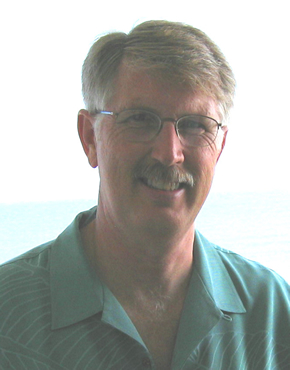 Dear Lanterman Community,
Dear Lanterman Community,
In his inaugural address, Governor Brown warned that “painful” budget cuts will be required to close the estimated $25 to $28 billion shortfall projected for the state budget this year. We feel a greater sense of urgency than ever before knowing that California is facing years of reduced budgets and sweeping cuts to health and human services, education and other critical programs, including developmental services.
In the face of this worsening crisis, we have revised and reaffirmed our white paper, “Sustaining the Entitlement for the Developmental Services System: A Regional Center Perspective.” The original version of this paper was published in 2003 by Lanterman Regional Center’s board of directors. It has been updated several times and the current version was approved by the Lanterman board in December 2010. The paper looks closely at the Lanterman Act and the political, social and economic factors that have affected its evolution since it was passed in 1969. It includes a set of definitive recommendations for changes to the entitlement program described by the Act that are intended to help ensure that it will be there for future generations.
We are distributing this paper widely to individuals and organizations both within and outside of the developmental services system. For example, we will send it to Governor Brown and individuals in his administration, to members and selected staff of the California Legislature, to the board of the Association of Regional Center Agencies (ARCA) and to disability and advocacy organizations such as the State Council on Developmental Disabilities and Disability Rights California.
Lanterman Regional Center has always tried to be part of the solution and provide leadership in dealing with challenges to the developmental services system. For example, in response to the severe financial challenges in the early 90s, and with the support of our community, we implemented changes that helped us live within limited budgets while promoting fairness and equity for clients and families. Some of the changes we implemented at that time continue to serve us well today, and we believe that they would provide the same benefits if implemented throughout the State. In fact, some of these changes were included as recommendations in previous versions of this paper and were adopted by the State to be implemented across all regional centers. The Budget Trailer Bill of 2009 included a number of the changes that we have endorsed over the years.
Rather than becoming involved in trying to find solutions to the State’s continuing budget crises, some individuals and organizations associated with developmental services continue to publicly resist any cuts to regional center budgets. Given the severe economic crises that we will certainly be facing well into the future, it should be clear to all that such a strategy is futile. We are more convinced than ever that we must all come together – regional centers, clients, families, providers, advocates and policy-makers – to set principles and priorities that will ensure that the critical services will always be available to people with developmental disabilities.
While we realize that not everyone will agree with all of our recommendations, if we fail to seize this opportunity, we fear ever greater restrictions on eligibility, long waiting lists for service, continued stagnation and reduction of rates paid to service providers, greatly diminished service quality and, finally, the death of the entitlement. With the continuing support of our community, we will keep on working toward solutions that will help preserve the entitlement for current and future generations.
We welcome your comments and encourage you to share them with us. Please submit them via e-mail to .(JavaScript must be enabled to view this email address).
Sincerely,

Larry DeBoer
President, Lanterman Board of Directors
Read “Sustaining the Entitlement for the Developmental Services System: A Regional Center Perspective” (PDF, 217KB)
2010 Lanterman Holiday Message

Youth Leadership Forum Applications Now Available
This is a special invitation for California high school juniors and seniors who have disabilities that are interested in applying to attend the California Youth Leadership Forum for Students with Disabilities (YLF) July 24-28, 2011 in Sacramento. Students will have the opportunity to live on a college campus and join more than 900 alumni from across the state that have been a part of this unique program created specifically for young leaders with disabilities. At no cost for the junior and senior students attending a high school in California!
Students who attend YLF make new, life-long friendships and make resource connections to help them reach their personal, academic, and career goals. Many Alumni of the California Youth Leadership Forum say it has forever changed their lives for the better.
You can go to www.calylf.org for more information, a copy of the application and instructions. If you experience any difficulty in filling out this application, help is available. Please contact YO! Disabled & Proud at 866.296.9753 or TDD 800.900.0706.
Deadline to submit applications, January 7, 2011 by close of business.
*Please remember to read the instructions carefully, there are a number of critical questions that must be answered when applying for YLF. Example, applications must be submitted electronically or may not be accepted. Incomplete applications may also not be accepted.
Page 4 of 6 pages ‹ First < 2 3 4 5 6 >




























.jpg)


.jpg)

.jpg)




















 Dear Lanterman Community,
Dear Lanterman Community,



